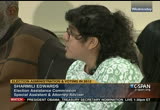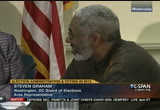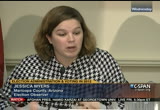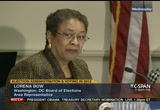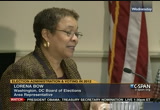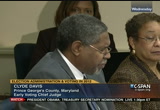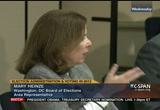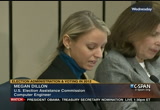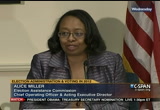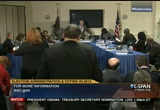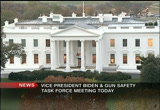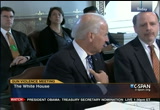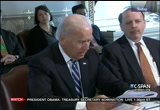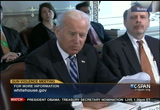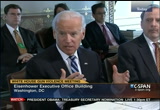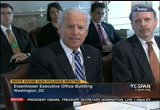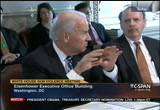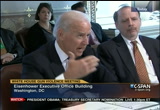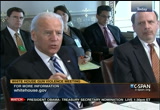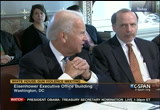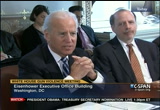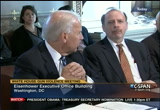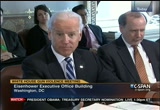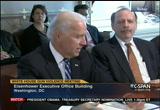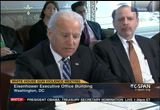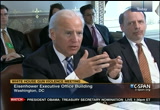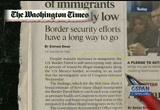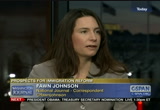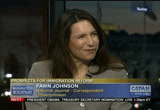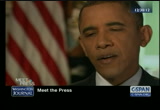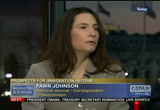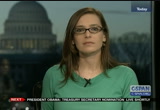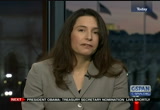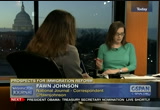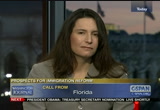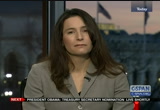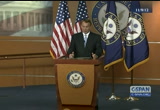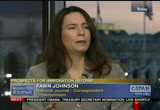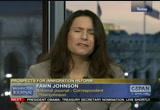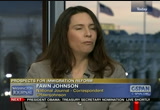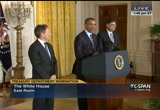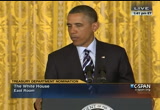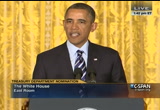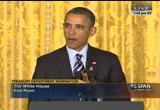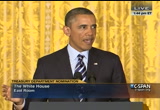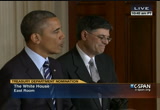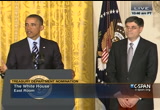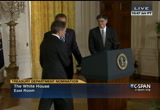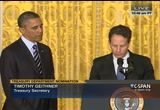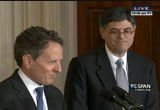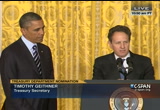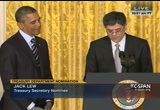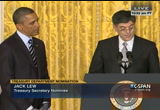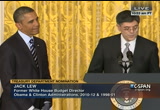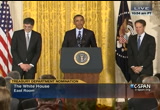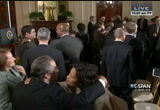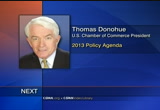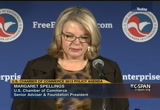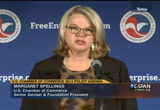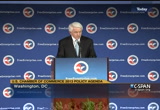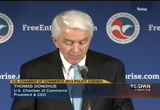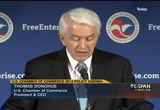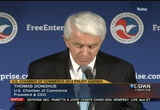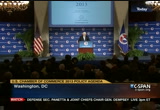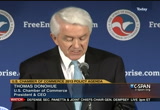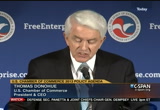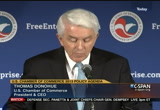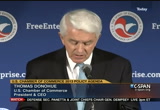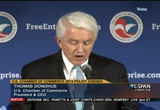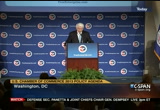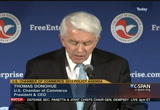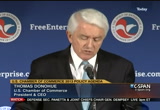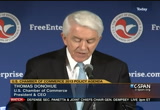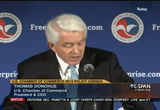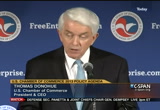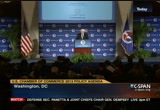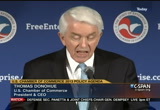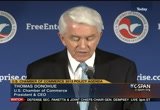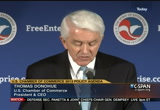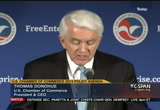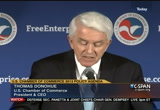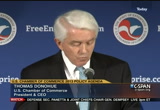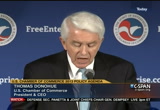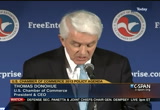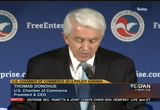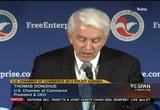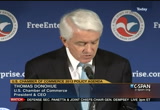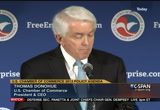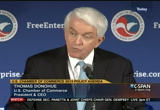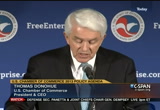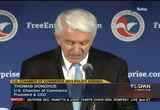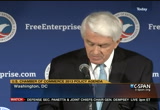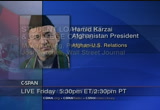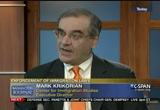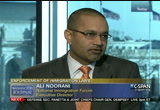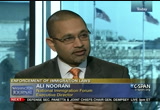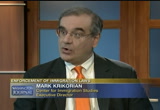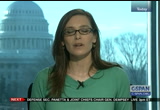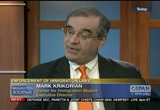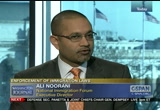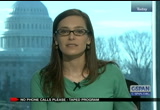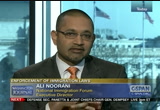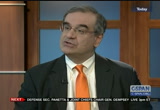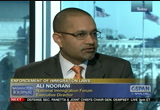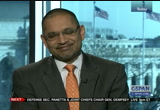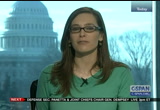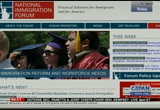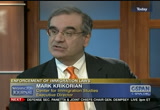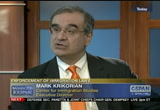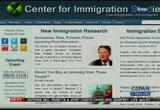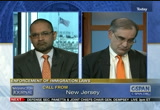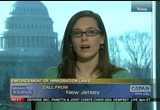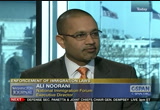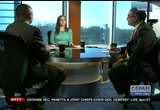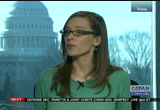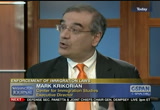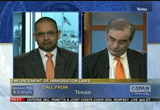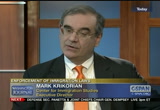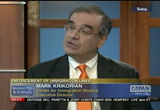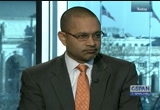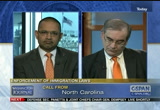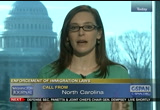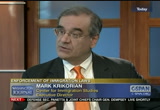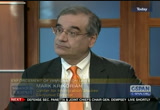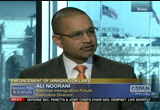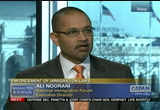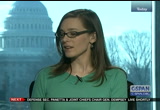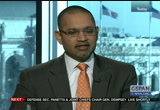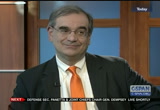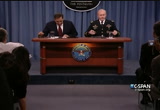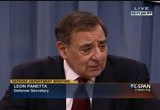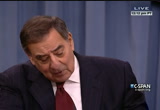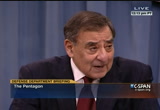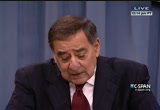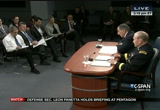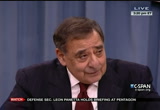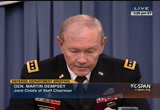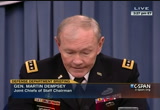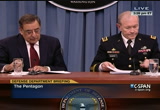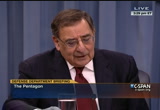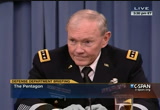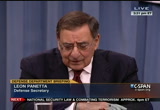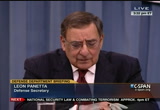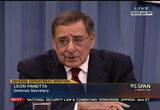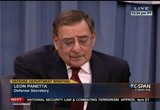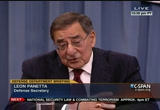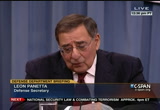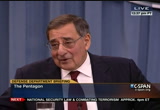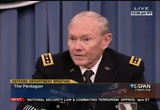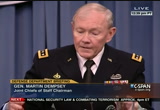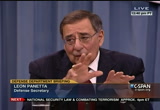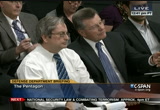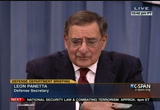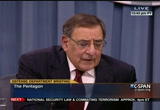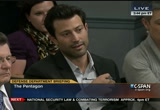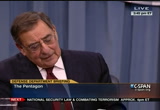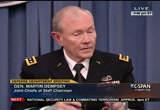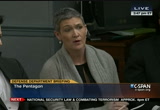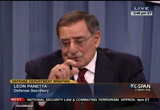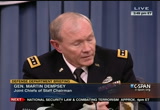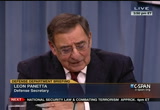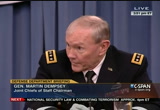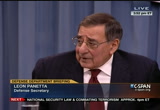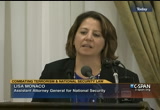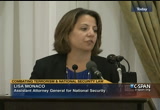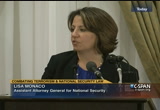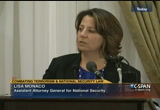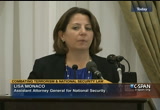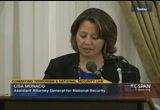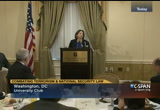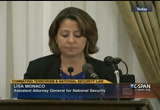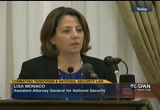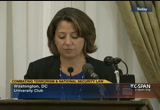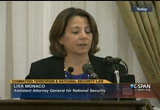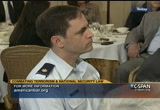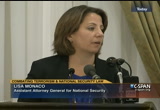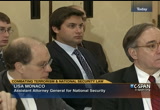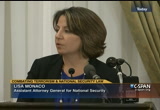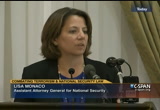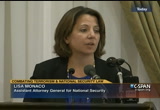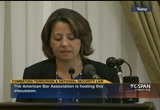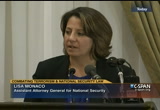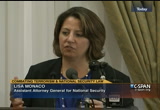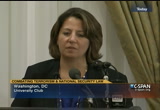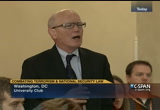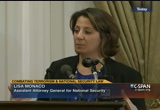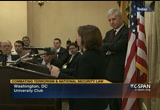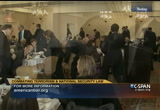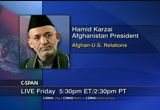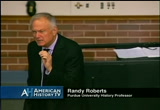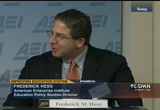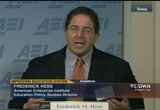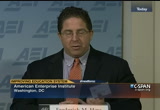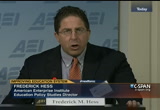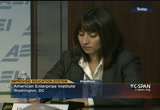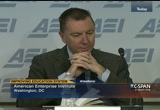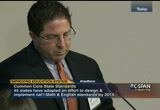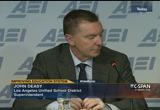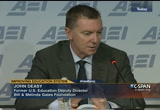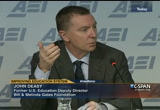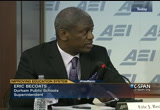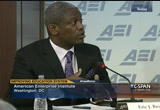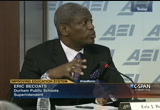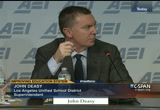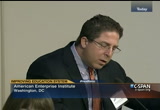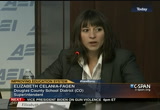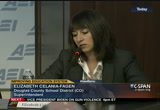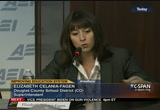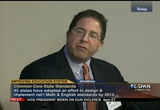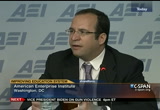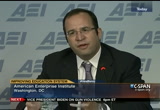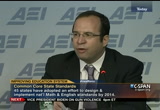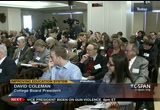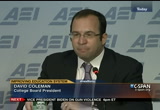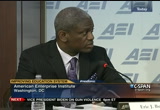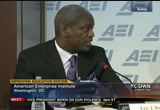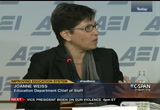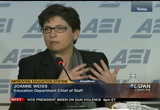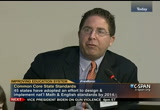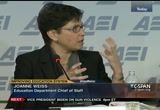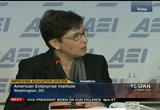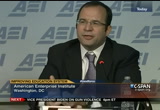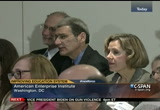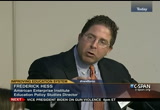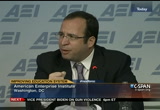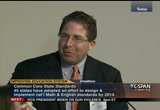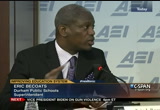tv Public Affairs CSPAN January 10, 2013 1:00pm-5:00pm EST
1:00 pm
it. but touchscreens, sometimes people would say the machine is broken, it is not actually broken, but you do need to press down on the screen, and that is reality is a user error. >> ok. thank you. speaker? >> what i would suggest -- especially during the early voting, as opposed to having the touch screens, having all paper ballots. there are a lot of senior citizens and disabled that are familiar with the touch screen. they come into the precinct asking for paper. i think if there were paper ballots in the precinct, that would make the process moved a little quicker. also, to the officials, city officials, i think it would be a good thing to give the children
1:01 pm
a lesson in school. that will also help the process move faster. ok. thank you. -- >> ok. thank you. >> i think we have worked extensively with community groups, all of that, but one of the things on the other side of this is, from all the voter interest groups, political parties, media outlets, blogosphere bloggers -- now before we get to the next round of elections, tried to work out something so we can get the accurate information out to your voters. that is the goal of the election officials, get them all the
1:02 pm
information they need. one of the most significant problems was unusual reports that were inaccurate that had this ripple effect throughout the county that caused huge problems throughout the election. i urge everyone to start working those relationships out now. get out the information. we have less and less and less information for voters, for media, for everyone. build this relationship now. >> ok. >> i want to take all little personal liberty here. i hope when i get back to work i will not be in trouble keeping but i want to talk about how we treat senior citizens. i often think we are not very comfortable. i know we have occurred stop ballot voting.
1:03 pm
-- curb ballot voting. we have senior citizens coming into the precinct. walking with canes, holding the hands of their children and great-grandchildren. they wanted to participate. some of the captains would get them out of line, bring them to the front of the line. some people complained about that. what i am saying, my personal point on this is -- these people were the people that thoughts -- that fought so i could walk into a precinct and vote. we are telling them they have no place to sit and wait. we could have a senior voting sections. may be a section where our seniors could go -- and now we want to address all populations, but i'm talking about our senior
1:04 pm
citizens, because it is upon their shoulders that we stand. >> thank you, lorena. >> there are several things i would like to see. i think need a larger -- longer training time for our chief justice's who supervised the polling places on election day. number two, i think we need to account for those with disabilities. third, to the voter, i think the voter needs to be prepared. one of the things we found out is there were long lines at the voting no. we had -- i think it was eight ballot issues. the ballot voters stood up their reading that. look, read those, be familiar with that before you get to the boating unit. that will cut down on our time. >> ok.
1:05 pm
mary? >> i think my comments will be similar to others that have been mentioned. perhaps better voter education about the tools that are out there to help them know where they need to vote, more staffing at the polling places where a captain or assistant captain could actually go through the front lines, the czech and lines to interface with the voters, say has anyone -- checkin lines to interface with the voters, say has anyone got any questions? i can check for you. that has become a real issue with all of the precincts. so come up voter education might be part of it, and i think early voting has law lot of voters into thinking "i can vote anywhere." and the only races they care
1:06 pm
about will be counted and in some cases the lower level races, they may be upset about. but it is like a shrug it for them and they say, oh, well. i think some of the lower races, some of the ballot initiatives, the more localized issues -- there might be a real problem in the end. so. >> thank you. i have a few things that have been touched on by almost everybody here. just to the voters, about being prepared. i know in arlington county, you can go on the web site. it tells you exactly where to go, exactly what is going to be on your ballot. if we can get that information out there, we can speed up the process. if they show at the precincts and are prepared, we will have a
1:07 pm
quicker time. and for poll workers, it keeps coming back. and arlington county, the poll workers to have been at a few elections knew how to handle these situations and shared that information with new poll workers. i would encourage the new poll workers to keep coming back year after year. >> ok. thank you so much. alice? >> let me thank everyone. these things happen because you are willing to come in and participate with us. we could not do this without you. obviously, we will take this information, develop best practices, get out guidance to our election officials that me hopefully help -- i will not say better elections, but smoother and elections, so we can continue to have it be the process we wanted to be. i will say, i think the currency
1:08 pm
here is voter responsibility. so, just as our election officials are responsible, voters also have to take responsibility. thank you. >> thank you. on behalf of your election colleagues around the country, i thank each of you for coming here today, coming prepared here today, sharing your perspective on this election and your advice as we prepare for good elections in following years. again, thank you. state travels. we will take a 15-minute break and reload the tables. [captioning performed by national captioning institute] [captions copyright national cable satellite corp. 2013]
1:09 pm
>> coming up in about 20 minutes, we will take you live to the white house. president obama is set to name jack lew as the next treasury secretary, becoming the 76 to treasury secretary so far. so far only one republican has come not in opposition. we will hear from the president and likely jack lew as well. vice president joe biden continues meetings on the gun violence task force coming hearing from walnut -- wildlife interest groups this morning. he is doing a widespread review of the safety laws. he will be meeting in about half an hour with the national rifle association. president obama has set a late january deadline for vice- president biden's proposals. before the meeting got under
1:10 pm
way, he spoke to reporters for about 15 minutes. >> let me thank you all for being here. you represent the bulk of sportsmen in this country, and you all know this is a complicated issue. there is no singular solution to how we deal with the kind of things that happen in new town or colorado or the general gun violence in america today. the president and i and the cabinet, we understand it is a complicated issue. that is why when the president asked me to do this in conjunction with my colleagues in cabinet, what we did was, we put together a pretty extensive list of what we consider to be the stakeholders wanting to deal with the issue of gun violence in america. the first groups mean that west where -- would not surprise you.
1:11 pm
national law enforcement organizations. also, we got a sense of -- to give you a sense of what we have done so far, we met with the american medical community, a group of about 15 leading medical doctors representing organizations across the country. we have met with at risk youth and children's advocacy groups from the alliance to promise america to the boys and girls club, etc. we believe this is cultural as much as it is weapons themselves. we met with domestic violence prevention communities. we met with justice organizations like the aba. we met with the national legal
1:12 pm
aid and defenders associations, prosecutors. we met with national service organizations. kawano as, rotary international. we have met with youth groups. we have met with gun safety advocates. yesterday that meeting took place here. also come up a dozen other organizations -- also, a dozen other organizations. and we met with educators and parents from the school boards to the state school offices and associations. again, the governors of those folks. and maybe one of the most important things we have been focusing on is the mental health community. the american academy for childhood and adolescence
1:13 pm
psychiatry, the national counselor community of behavioral health centers. there is a perspective among health providers that mental illness is a major component. and yesterday, we finished up on in this room with about 17 members of the faith community, which in all the years i have been doing this, the first time there has been overwhelming consensus on the evangelical groups nationwide. particularly those from the rural areas. the national catholic conference of bishops. the muslim community. because this does up a significant moral dimension to it. how do we make the american community safer? how do we go about it? and tonight, we meet with too. later, i need with industry
1:14 pm
representatives, as well as the nra, and the executive director of defense, the head by a 3 -- the small arms advisory council, etc.. the point i am trying to make to you is, we realize this requires all the stakeholders to give us the best ideas as to how we deal with what i said at the outset is a complicated problem. there is no single answer. to go back, i know a lot of you have been dealing with this issue since my times as chairman of the judicial committee of the way back and in the 1970's. if you look at the tragic events that have attracted some much attention, it is hard to pinpoint what you could have done to be sure it did not happen. but there are also things we know. we know there are certain
1:15 pm
actions we take back that have diminished the extent of gun violence that otherwise would be occurring in the united states. and so, the kinds of things -- there is an emerging set of recommendations. not coming from me, but coming from groups we have met with. and i am going to focus on the ones that relate primarily to gun and ownership and the type of weapons that can beyond. one is, there is a surprising -- so far -- surprising recurrence of suggestions that we have universal background checks. not just closed with the gun show people -- local, but total universal background checks. there has been a lot of discussion from the groups we have met with so far. i think the chairman has been in
1:16 pm
any meetings with me. -- has been in almost all the meetings with me. how do we share the information? how to get information -- for example convicted felons in the state -- how do they get in the nics? that is the thing that the gun dealer goes to to check your background, whether you are a felon. it does not do a lot of good if some states have a backlog of 60,000 felons they never registered. so, we've got to talk about -- there's a lot of talk about how we entice or what is the impediment keeping states from relaying this information. there's also a good deal of talk about gun safety. and what responsibility goes along with gun ownership.
1:17 pm
that is something i am really anxious to talk to all of you about. there's also -- surprising -- my former colleagues in the senate who have previously been opposed to any restrictions on gun ownership or what type of weapons can be purchased, as ever, there is i have never heard quite as much talk about limiting high-capacity magazines as i have heard spontaneously from every group we have met with so far. and the last area, which is an area that has come up, is the question of the ability of any federal agency to do research on the issue of gun violence. for example, we are meeting before the week is out with the video gaming industry.
1:18 pm
to use pat moynihan's expression, when we first started talking about this, back said we980's, he started by defining deviancy down. he said we had this fascination with violent thoughts back in the 1930's, and he stood on the senate floor and he held up the new york times. on page 54 -- in the very back of the paper -- and entire family including grandmother, mother, father, children were basically assassinated in their apartment. they think it may have been about a drug deal. he said "we can define it
1:19 pm
deviancy down." one of the things that prohibit -- the early part of this century, 2004, the centers for disease control gathering information about the kinds of injuries and what sort of energies and what are the source of the injuries? it kind of reminded me in a meeting yesterday. i was around in the 1970's. the only guy who can remember this -- i hope i am not insulting him -- is ray lahood. he remembers the auto industry. he remembers the whole question of traffic safety and highway safety. there was a big fight when i first got in the senate that began in the late 1960 fell through early 1970's. the automobile industry did not want to allow the department of transportation to acquire statistics on the type of
1:20 pm
accidents that occur. they were not able to literally acquire the information. because the concern was it would lead to calls for some rational regulations for the guardrails for automobiles. i remember when we finally broke through and the department of transportation started keeping misinformation, they found out -- if my memory is correct -- the vast majority of drivers -- the steering wheel damage to their solar plexus, penetrated their upper body cavity, damaged their heart. the reason the industry did not want us knowing that, we had to do something about the steering
1:21 pm
wheel. make sure that the steering wheel collapses. all of a sudden, they said -- you cannot make an automobile that does not have a steering wheel column with the following attributes. you have to make an automobile that can absorb excess amount of shock. all of a sudden we found out passengers were being killed going through the windshield. skull fractures, hitting their head on the cross bar. all of a sudden, it made sense. why not make airbags. -- why not make air bags? we are saving lives. as you know, the real restrictions now on the ability of any agency in government to gather information about what kind of weapons are used most to
1:22 pm
kill people. how many weapons are used in traffic accidents? our weapons used in gang warfare in our major cities? are they legally purchased or purchased through a straw man? we do not have that information. and the irony is, we are prohibited under laws and appropriations bills. i want to talk to you all a little bit, as an owner of shotguns, as a guy who is no great hunter -- mostly caskey shooting -- i do not quite -- mostly skeet shooting -- i cannot quite know how we determine what is happening. there are a whole lot of things i want to talk to you about. i did want to talk to you about what we have done so far. we will meet again.
1:23 pm
this afternoon we had meetings. tomorrow afternoon we have meetings. i am trying to have a telephone conferences with the manufacturer's. there has got to be some common ground here. to not solve every problem, but to acknowledge the probability that we have seen these mass shootings occur and to diminish the probability that these shootings will occur as schools and to diminish the probability that these weapons will be used, firearms will be used dealing with the average behavior that occurs in our society. that is what this is all about. there is no conclusion i have reached with my colleagues. i have put together a series of
1:24 pm
recommendations. there is a very tight window to do this. i committed to him i would have these recommendations to him by tuesday. it does not mean it is the end of the discussion. but the public wants us to act. i will conclude by saying, in all my years involved with these issues, there is nothing that has pricked the conscience of the american people, nothing that has gone to the heart and mattered more than the visions that these people have of these little six-year-old kids riddled -- not shot -- riddled, riddled with bullet holes in their classroom. and the public demands we speak to it. and i am sure we cannot
1:25 pm
guarantee this will never happen again, but as the president said, if what we do and what we say only saves one life, that makes the difference. i do not believe we are imposing on the rights that the second amendment guarantees. now with your permission, let's get down to business. i think the press for being here. >> [indiscernible] >> we're going to talk about all these things. >> the vice-president saying he would deliver the new gun policy proposals to president obama by tuesday. those meetings continue. he will be meeting with gun owner groups in about 20 minutes, including the national rifle association, the national shooting sports association, representatives from the entertainment industry later today. also attorney general eric holder meeting with retailers
1:26 pm
like wal-mart and bass pro shops. also today, a pentagon briefing with leon panetta and general martin dempsey. that is expected to start at 3:00 p.m. we are expecting to hear from president obama as he announces his next treasury secretary, jack lew, if approved by the senate. in the meantime, a discussion about immigration reform in the 113th congress. host: this morning in the washington times -- it says --
1:27 pm
host: from the "new york times," we also see a piece this week looking at a new study on enforcement and the money spent enforcing immigration laws. it says a new report sets the stage for a debate on immigration overhaul, huge amounts of money spent on immigration. joining us this morning to get our conversation started is off and on johnson of national journal. -- fawn johnson. she's a washington, d.c., correspondent who covers immigration among a variety of other topics. thanks for being here. guest: pleasure. host: are there prospects for immigration reform, changes to the law in 2013? guest: sure. i think that this is the first breath of activity that we've seen in about six years. the president has named it as his top priority, and he has not backed away from that, despite the fact that some of the fiscal cliff problems that we saw at the end of last year still haven't been resolved. and all indications that i have from anybody who knows about it is that the talks are going forward.
1:28 pm
now, whether or not anything is actually going to happen in the end is still something that remains to be seen. it's as tough as it was in 2006, 2007, when we last debated this. host: you mentioned the words fiscal cliff. we saw the debate over budget issues unfold around the new year. it's not over yet. is that conversation done? at what point can the white house and congress move on to something else? guest: well, i'm guessing -- and this is just me observing -- the conversation probably isn't going to be done until the next election or until something else changes. this is something that clearly, particularly republicans in the house really want to push. they're going to use every opportunity that they can. we managed to get some of the tax issues taken off the table at the end of last year. that was difficult for a lot of us to watch. but there's still some questions about spending. that's going to come up in the next couple of months. there's appropriations to be done. i imagine that conversation will keep on going. and i was very worried after i first came back to work after the break, because i said, well, what is this going to do for the immigration agenda?
1:29 pm
having covered this in the past, i know how much energy it takes from members. but i don't think that the members who are going to be the most involved in the fiscal cliff spending kinds of discussions are the same ones who are going to be pushing on immigration. and as long as you have someone in the senate, like majority leader harry reid, who also wants to move forward, i think you're still going to see some action. host: let's hear what president obama had to say. this is when he was on "meet the press" right before the new year, him talking to david gregory. >> i'm asking about time frame, as you well know, your second- term president, even having one re-election, your capital is limited. what is your single priority of the second term? what is the equivalent to healthcare? >> well, there are a couple of things that we need to get done. i've said that fixing our broken i will great system is a top priority -- our broken immigration system is a top priority. i will introduce legislation to get that done. we've talked about it long enough. we know how we can fix it. we can do it in a comprehensive
1:30 pm
way that the american people support. that's something we should get done. host: president obama on nbc december 30. how much of that, off and on -- fawn johnson, do you hear as a response to the election? guest: well, it's largely a response to the election, but keep in mind that the president made this particular priority before the election, which it's hard to say exactly what drove that. but one of the things that has been very clear throughout his first term is that the latinos who helped him get elected in 2008 were very upset that not very much happened over the course of obama's first term. he was very focused on healthcare. and i think the president genuinely wants to deal with this issue. everybody who has been involved in it knows how difficult it is. he just wasn't able to put the energy into it he did in the last term. once the election happened, it became clear to republicans that they couldn't just say no like
1:31 pm
they had been doing over the last four, five years, because the hispanic population only voted for obama. that kind of sets up a much more friendly environment to talk about the issues. host: fawn johnson, correspondent with national journal, we're focusing the "washington journal" this morning on issues surrounding immigration. later on, we'll talk to some reporters as well as folks on both sides of the issue right here on n washington, d.c. haour first phone call is from ryan in texas on our democrats line. hi, ryan. caller: yes, how you doing? host: good. caller: i would like to say, they're not going to enforce the immigration laws. some of the people that i know out with these charges, that they're not going to follow immigration rules, just some of these guys that got these crack charges and trying to get back to their families. host: you're talking about drug charges?
1:32 pm
ok. let's go to trevor in arlington, virginia, on our independent line. hi, trevor. caller: hello. how you doing? host: good morning. caller: basically the premise of my question is, you know, everybody involved in deciding what's going to happen with immigration, you would think they would have to be thinking, how much more revenue can we get if we do legalize the 13 million or whatever undocumented workers? i mean, that has to be an upside. and also, how it's related to the war on drugs, you know, affecting where they come from and how violent it is, and really pushing them north. it really is all interrelated, and mainly, i would say you would have to think there's an upside to gaining the extra revenue. that's it. host: thanks for your call. fawn johnson? guest: i agree. that's an interesting point, especially when we're talking about spending. i haven't seen the full debate yet about the costs versus the advantages or the fiscal advantages of having more legal immigrants inside the country.
1:33 pm
keep in mind that a lot of them are already here, and whatever they wind up doing is probably not going to increase the flow of immigration that much. since 2008, the recession, there's not been as many people wanting to come here just because there aren't as many jobs. it is true, however, that if you are able to come up with some sort of legal status for all of the people who are undocumented, that you would get a greater tax revenue. most of the proposals i think obama would also endorse, would not make them eligible for the kind of benefits that are very costly for things like healthcare and medicaid and stuff like that. they would be in the schools that i believe they railroad will, so i don't think that's a huge change. i think you're going to have people who are going to talk a lot more about that. host: here are some numbers that the cato institute developed, how overhauling immigration law might alter the economy. we see the cost of mass deportation. they estimate that to be $2.6 trillion. temporary worker program, they see it as a benefit to the u.s.
1:34 pm
economy of nearly $800 billion. and then comprehensive revisions to immigration law, $1.5 trillion. they say that would entail giving unauthorized immigrants a pathway to permanent legal status and citizenship, also open the border to new immigrants who would have full labor rights so. one snapshot of that financial picture. well's up next, joining us from florida on our democrats line. what part of florida are you from? turn down your tv for us and go ahead. caller: ok. yes, first of all, good morning, everybody. we're all immigrants. we come from other countries. and we all have to learn to get along, you know? so i say let's go here and let's get this reform, a situation, then go on the table, and let's get it worked out from and get these jobs back so we
1:35 pm
can get all our jobs in this country, a great country. host: william, what would reform mean to you? what would immigration, your version of immigration reform, look like? caller: what it would mean to me? host: what would you do? what would you change? caller: not be -- not be like -- like putting fences up and all these deportation and stuff. everybody come to the country because it is a great country. and my view of it is what it has been since 1960. you know, come to america, something that's great. it should be that same way. we should all feel that same
1:36 pm
way. if they don't go to other countries to be sold back, we should have our business here for everybody to come, give their part, and share in making it a better country. host: ok. william is a democratic caller. let's listen to what house speaker john boehner had to see. this is after the election, speaker boehner speaking from the capitol. >> i want to go back to your comments about immigration reform. when you said comprehensive immigration reform, are you endorsing a pathway to citizenship? >> well, i'm not talking about 3,000. what i'm talking about is a common-sense, step-by-step approach to secure our borders, allow us to enforce the laws, and fix a broken immigration system. but again, on an issue this big, the president has to lead. i think members on both sides of the aisle want to resolve this issue.
1:37 pm
the president's going to have to lead here. >> are you endorsing a pathway to citizenship? >> i'm not going get into any of the details of how you would get there. it's just time to get the job done. host: house speaker boehner has called for comprehensive immigration reform changes to the law. does it look like what the white house would want? >> you saw from that clip that he was really not specific about what he wanted. i have heard from his aides also that they really want the president to lead. the big question that i have is, what happens if the president leads? we have seen what the house republicans do when the president leads. they usually just reject it out of hand. the people that i talked to who are involved in immigration in the house tend to want to do something that's a little less ambitious than what the president is talking about doing. they want to have little different parts of the law go through committee and pass the house on their own. theve seen in the house
1:38 pm
unwillingness to look at any legislation, and they have a hard time as we saw with the fiscal cliff getting those on the republican side. i don't think it's going to look anything like what happens with the president. the other question is, nobody is expecting the house to act on this until the senate does something. the senate will probably do something that's much broader and will encompass all aspects of immigration. host: here are comments coming from twitter. joe writes, we do have to address the problem with immigration and the welfare state, but i think that's easier than securing the borders. with another perspective, fred says, no reform until the border is secure. secure the border before passing any more laws, please. guest: yeah. those are actually probably the best perspectives that you can have on this debate. one of the things that i found interesting is that the question about border security is starting to get a little more sophisticated than it was back several years ago when this was first being debated. the administration has put tons of resources into enforcement
1:39 pm
to the extent that a lot of advocates, particularly civil rights advocates, are actually very angry about it. it's never going to be perfect. i think that that's the place where the last comment that you read comes forward. we still have people who do constantly believe that a lot of them are criminals, drugging drugs or people. nobody wants that. so the question is, how much more needs to happen on the border and inside the united states before other kinds of reforms can happen? i believe that what the administration has been trying to say for the last two years is we've done that. look at the number of people we deported, something like 400,000 people, which is more than any president ever has in the last, you know, in all of history. the border is looking much better. i've been down, i've looked at it, it's looking better, but there are still problems. the question is, is it ok? that's going to be -- there's going to be competing versions of that no matter what happens. host: here are some of those numbers.
1:40 pm
on u.s. immigrant deportations, you can see the total so far during the obama administration, 1.5 million. for the entirety of the bush administration, two terms in office, we saw about two million deportations. and then in 2012 alone, nearly -- more than, rather, 400,000 immigrants deported, which is a record high. our next phone call is from mark in new jersey, republican. hi, mark. caller: good morning. i'm also a municipal chair here -- >> more of this in an hour of video library at c-span.org. would take you now live to president obama and his choice for treasury secretary. >> a little more than four years ago i stood with mr. tim geithner, the first nominee to my cabinet. we were two months into the financial crisis. the stock market had cratered. the stock market -- bank after bank was on the verge of
1:41 pm
collapse. worst of all, more than 800,000 americans would lose their jobs in just that month. at the bottom was probably not yet in sight. i could not blame tim when he told me he was not the right guy for the job. [laughter] extensivews that tim's experience with economic policy made him eminently qualified and i knew he could hit the ground running. as chairman of the federal reserve, he had just spent chaotic weeks emerged in the crisis and had been working with the treasury to save the financial system. then when the wreckage -- with the wreckage of our economy still smoldering, i asked tim to help us put it back together. thanks in large part to his steady hand, our economy has been growing for the past three years.
1:42 pm
our businesses have created nearly 6 million new jobs. the money we spend to save the financial system has largely been paid back. we put in place rules to prevent that kind of financial collapse from ever happening again. the auto industry was saved. we made sure taxpayers are not on the hook if the biggest firms fail again. we took steps to halt underwater homeowners come up for air and sell goods overseas. we have begun to roost -- to reduce our deficit through a mix of spending cuts and a tax system that when we came in was too skewed toward wealthy americans. when the history books are written, tim geithner is going to go down as one of our finest secretaries of the treasury. [applause]
1:43 pm
don't embarrass him. [laughter] on a personal note, tim has been a wonderful friend and a dependable adviser throughout these last four years. there is an unofficial saying over at the treasury "no peacocks, no trucks, no wiener's -- no jerks, no whine rs." that would be a good saying for all of washington. some -- no one embodies that
1:44 pm
better than tim geithner. i had to get on my knees two years ago to convince him to stay on a little bit longer, and i could not be more grateful to carol and the entire geithner family for allowing him to make the sacrifices that are cabinet members ask of their families in serving their country. the fact is, while a lot of work remains, especially to build new pathways for working folks to rise into the middle class, our position is better for tomorrow than most of the countries hit by the financial crisis. the tough decisions have been made and carried out. i understand that tim is ready for a break. obviously, we are sad to see him go. i cannot think of a better
1:45 pm
person to continue tim's work at the treasury than jack lew. this is bittersweet not only because tim is leaving, but because jack has been my chief of staff for the last year. he was my budget director before that. i trust his judgment. i knew if -- i know your people with greater integrity than the man to my left. i do not want him to go, because it is working out really well for him -- for me to have him here in the white house. jack has the distinction of having worked and succeeded in some of the toughest jobs in washington and the private sector. he helped negotiate the deal between president reagan and tip o'neill to save the socialist purity -- social security. for all the talk out there about deficit reduction, and
1:46 pm
making sure our books are balanced -- he is the guy who did it. 3 times. he helped oversee one of our nation's finest universities and one of our largest investment firms. in my administration, he has managed operations for the state department and the budget for the entire executive branch. for the past year, i have saw his advice on virtually every decision i have made from economic policy to foriegn policy. one of the reasons he has been so effective in this town is he is a low-key guy who prefers to surround himself with policy rather than television cameras. he has worked with members of both parties to forge principled compromise. maybe most importantly, the son of a polish immigrant, a man of deep and devout faith, jack knows for every dollar we budget, every decision we make, it has to be an expression of
1:47 pm
who we wish to be as a nation. our values. values that say everybody gets a fair shot at opportunity. and that we expect all of us to fulfil our individual aspirations. jack has my complete trust. i know i am not alone in that. in the words of one former senator, having him on your team is like having a player on your team and you know he will do well. i thank him for that. i want to personally thank both of these men and their families -- especially carroll and ruth -- carol and ruth -- for their extraordinary service to this country. and with that, i would like both of them to say a few words. >> mr. president, it has been a privilege to serve you. i am honored and grateful that you asked me to do this.
1:48 pm
really, i am. i am proud of what the treasury and your economic team have been able to accomplish these past four years. when you stepped into the role of president, you were confronted with the worst crisis in generations. you may be necessary, perilous choices that saved the american people, save american industry, save the global economy from the failing financial system. the response to the crisis did not solve all the nation's challenges. it could not have done so. but the actions you took, along with those of a forceful and creative federal reserve, have made the country stronger and have put us in a much better position to face the many challenges still ahead of us. and they are many. i have the greatest respect for jack lew. i know him as a man of
1:49 pm
exceptional judgment, calm under pressure, with an extraordinary record of experience over the decades. he is committed to defending the safety net for the elderly and the pour. he understands what it takes to create conditions for broader economic growth and opportunity. and he understands that to govern responsibly is to govern with the recognition that we have limited fiscal resources. like jack, i have spent my professional life in this world of public policy and public service. as all of you know, our family carried a large share of the burden that we share in public like. i am incredibly proud that my family have been willing to allow me to do this and i think them for their support and their patients, and i understand there are occasional impatience.
1:50 pm
[laughter] i want to express my admiration for the men and women of the treasury department. those who serve you during these years of crisis, and the civil servants of the treasury, with whom i started working in 1988. they are exceptional public servants. i am very proud of what you accomplished and i am very confident my successor will find them to be the extraordinary assets they are to the nation. i am also hopeful that americans will look to the challenges we face today and decide, as many in this room have, that despite the divisive state of our political system today that serving your country is compelling and rewarding work. that was my experience. and i am grateful and will always be grateful to you for having given me the opportunity is to have served you as the
1:51 pm
75th secretary of the treasury. [applause] >> mr. president, it has been my honor to serve as your chief of staff, and before that the omb and the state department. it has been a privilege to come to work every day. tim, you have been a friend and colleague for many years. actually, decades. the american people are better off for your outstanding service. i thought i knew pretty well, but it was only yester day i discovered we both share a common challenge in penmanship.
1:52 pm
[laughter] i join the president and everyone here and in wishing you and your whole family well. since i was a kid growing up in queens, i had dreams of making a difference in the world. these dreams were nurtured in a home where nothing was ever taken for granted. a will always be grateful to my parents for grounding me in values that have remained central to my personal and professional life. i grew up professionally in the office of speaker o'neill, who demanded it unvarnished advice on how best to reach the destination. he did not care about rank, only about the hard work that informed the decisions of the day. i will always be grateful. serving at omb under president clinton and more recently with
1:53 pm
the administration, i worked with one of the finest teams in the government to execute fiscal policy while promoting economic growth. i am delighted to see so many of my friends from omb here today. estate department, i worked closely with the great secretary of state -- at the state department, i worked closely with the great secretary of state hillary clinton. as chief of staff, i have had the privilege of working with a tremendously talented white house team that manages policy, communications, and complex operations every day with zeal and loyalty. if approved, i will join the treasury department whose people are legendary for their skill and knowledge. finally, my thanks to ruth and the kids. thank you, mr. president, for
1:54 pm
your trust, confidence, and friendship. serving in your administration has allowed me to live out those values my parents instilled in me. [applause] >> these are two outstanding public servants. i think the only point i want to make, to leave you with -- i signature.ced jack's [laughter] when this was highlighted yesterday in the press, i consider rescinding my appointment. jack assured me, he is going to
1:55 pm
work to make at least one letter legible in order not to debase our currency, what should he be confirmed as secretary of the treasury. thank you very much, everybody. [applause] >> president obama teasing jack lew about his signature. if approved as treasury secretary, that signature will be on u.s. currency. he is better known for being a loyal lieutenants and budget hawk than a financial markets expert. jack lew, named by president obama, nominated to be treasury secretary. that follows a number of other
1:56 pm
cabinet nominations the president has made in recent weeks. john kerry for secretary of state comes chuck hagel for defense secretary, and of course john brennan as the cia director earlier this week. coming up, we will hear from the current defense secretary of leon panetta and the chairman of the joint chiefs of staff martin dempsey. we will have live coverage here on c-span. coming up, we will have a look at the cost of college education and student loans and whether college that could be the next bauble that might affect the economy. we will be joined by marian wang and josh michel. that is live at 8:00 p.m. eastern here on c-span. the national debt may be the single biggest threat to the national future according to
1:57 pm
thomas donahue. this is 35 minutes. >> good morning. happy new year, everybody. i am the president of the u.s. chamber of commerce, and we are pleased that you could join us for the annual state of american business address. before we welcome him to the stage, i would like to say a brief word about my friend and our leader tom donohue. looking back of the past year, the chamber has had victories and a few disappointments during a politically divisive time. under his leadership, the chamber pursued a pro-active, positive, bipartisan agenda to grow our economy and put americans back to work. at a time when collaboration and compromise were all too rare, he reached out to both sides of the aisle. where there is common ground, he has been able to work with
1:58 pm
groups whose interests and constituencies do not always a line with hours. when under attack, tom has tirelessly made the case for free enterprise and forcefully advocated or what he calls "the greatest economic system ever devised." when others argue that america's best days are behind us and the citizens and leaders are not up to the challenges before us, tom calls them out. in 2013, it was the 15th year at the those of us who work for him that he never slows down. he does not rest on his laurels. he does not stop challenging himself and all of us to do more and better. but today is not about looking back. it is about looking ahead. it is about what we can and must do to make america a stronger
1:59 pm
and more prosperous country. tom has worked hard to change the chamber's culture and i know it will be reflected in our agenda in 2013. without further delay, please join me in welcoming the u.s. chamber of commerce ceo tom donohue. [applause] >> thank you very much. margaret, i appreciate your comments. i will get even at a later date. i'd like to thank the u.s. for organizing this event, and thanks to all of you for being
2:00 pm
here. as many of you know, we like to begin the new year by looking at how american business is doing, discussing the key challenges facing our economy, and identifying the top priorities the chamber plans to work on. in some important respects, the state of american business continues to slowly improve. we believe the economy will grow throughout the year and not fall into another recession. the chamber is forecasting growth of 1.5% to 1.75% for the first half of the year, gradually accelerating to 2.5% by the end of the year. on the positive side, housing is continuing to improve, europe seems to be stabilizing, and energy prices are steady. big companies at home and abroad are flush with cash and looking for reasons to invest. on the negative side, the recent tax increases resulting from the fiscal cliff deal will
2:01 pm
hit successful small businesses hard, which will dampen growth and hurt job creation. as illustrated by the chamber's latest survey of small business members, there is significant uncertainty over health care, regulations, taxes, and deficits. last week's jobs report was mediocre. only 63% of our eligible workforce is even participating, and we don't see much improvement in unemployment through the year. so while our economy may be growing, it is fragile growth and not nearly strong enough to create the jobs americans need or to expand their incomes. and now, we face a series of new washington deadlines over
2:02 pm
deficit spending, the debt ceiling, sequestration, and a continuing resolution to keep the government running. we also face other domestic and international uncertainties that have the potential to drive down confidence and discourage job creation -- from a regulatory flood here at home, to economic problems in europe and japan, to geopolitical conflicts that could erupt into war at any time. we must also be concerned about america's capacity for leadership and action -- and not only in government. is this a country that can still get big things done? do we have leaders with the courage to put the country first -- ahead of their own
2:03 pm
careers, politics, ideologies, and egos? can we find leaders in government who truly appreciate the role that the private sector can and must play in building a new american prosperity? the imperative of economic growth should not be an afterthought. it should be job one. economic growth must be front and center here in washington -- just as it is in many state capitols across the nation, led by innovative governors from both parties. today, 23 million americans are unemployed, underemployed, or have stopped looking for work. a record 47 million people are stamps. median family income has dropped to 1995 levels -- so we're going backward.
2:04 pm
millions of new college graduates, many of them deeply in debt, can't find promising positions in their fields. what is happening to the american dream for them? we see despair in our urban areas where up to 50% of our young people don't even graduate from high school. we need to build an economy that gives them hope too. from top to bottom we need more success in america. we need to nurture success, empower it, reward it, and celebrate it. this is why the chamber will advance the american jobs and growth agenda this year. the over-riding objective of this ambitious plan is to generate stronger economic growth in order to create jobs, lift incomes, and expand
2:05 pm
opportunity for all americans. we are fully aware that economic growth alone cannot solve all of our problems. but without growth, we will not be able to solve any of them. our plan contains many proposals and reforms, which we will be discussing and advocating all year long. but in the short time we have today, i'd like to highlight five key issues -- * producing more american energy, * expanding american trade, * modernizing our regulatory system, * reforming immigration and visa policies, * and addressing the fiscal crisis with a bold plan that slows the growth of spending, reforms entitlements, and overhauls our tax code.
2:06 pm
let me begin there, because the next battles over the nation's fiscal condition have already begun. as i mentioned, congress and the administration are soon to face new critical deadlines around the debt ceiling, sequestration, and the need to fund government operations. these deadlines will mean more uncertainty for our economy, our businesses, and for financial markets at home and abroad. as they address these deadlines, policymakers must seize the opportunity to make real progress in the areas they neglected in the fiscal cliff deal. first and foremost, that means controlling deficit spending through common sense entitlement reform. the last debt ceiling increase was passed in august of 2011.
2:07 pm
here we are 17 months later and the $2.1 trillion is gone, kaput. and now we need another increase. how much longer can this kind of spending go on? as a nation, we must finally face up to the single biggest threat to our economic future -- and that is our exploding national debt driven by runaway deficit spending, changing demographics, and unsustainable entitlements. if we fail to address this threat, automatic spending will soon consume every dollar the federal government collects, leaving nothing for education, national defense, or other essential programs. we have no illusions that
2:08 pm
putting our country on a sound and responsible fiscal course will be easy. it clearly will not. our government is divided and conflicted because the american people are divided and conflicted. but we cannot ignore this crisis any longer. nor can our leaders. as important as economic growth is, we can't grow our way out of this problem and we certainly can't tax our way out. we must address the fundamental reality that, due to our aging society and increased life expectancy, the entitlement programs written and designed for an earlier era must be revised. we're not talking about cuts in absolute terms -- we're simply talking about slowing the rate of increase. this can be achieved with
2:09 pm
reasonable adjustments phased in over a number of years. comprehensive tax reform is another essential part of the solution to our fiscal crisis. the right kind of tax reform will make us more competitive across the globe and empower our businesses, small and large, here at home. the right kind of tax reform will turbo-charge our growth, create jobs, and generate more revenues for government at all levels. but make no mistake. while there are solid economic and competitive reasons to pursue it, tax reform cannot be seen as a substitute for spending restraint. our spending problem must be addressed before, or concurrently with, comprehensive tax reform.
2:10 pm
let me say a word now about energy. now all last fall, the chamber talked about how fortunate we are in the united states to have a third bucket to draw from to address our deficits and debt. the first bucket is spending. the second bucket is revenues. and the third bucket is energy, which is the next priority i'd like to discuss. proceeding swiftly and responsibly to develop more american energy can help us immeasurably with our fiscal problems, but it can also do so much more for our country. we have more oil, gas, and coal than any other country and we
2:11 pm
are now the largest single natural gas producer in the world. we are now in a position to export liquefied natural gas and coal, and thus reducing our trade deficit and bringing billions of dollars into the united states. the abundance of affordable natural gas is attracting good manufacturing jobs back to america, particularly in the chemical and steel industries. all of this adds up to a lot of jobs, growth, improved national security, and more revenues for government. according to the american petroleum institute, oil and gas companies already account for 9.2 million american jobs and pump more than $500 billion into our economy. over the next 20 years, energy
2:12 pm
can create millions of additional jobs, spread all across this country. in the last few years, shale activity alone has created 1.75 million jobs. between now and 2035, we can double shale's economic impact, double the number of jobs, and generate a cumulative $2.5 trillion in government revenues. to achieve these great benefits, we need to safely open up new land to exploration. we've foolishly locked away too much of our resources on land and off our coasts. we need a predictable and fair regulatory environment. the federal government shouldn't pick the winners and losers or subject energy projects to endless and duplicative reviews. such roadblocks have stymied
2:13 pm
vital projects like the keystone xl pipeline, which must be built. we should stop epa's senseless and ideologically driven battle to ban the production and use of coal. we should continue with the next generation of nuclear power plants. and we should waste no time in pursuing research to develop alternative energy sources, such as wind, solar, and geothermal. by fully embracing america's energy opportunity, we can accelerate growth, create millions of new jobs, free ourselves from some less-than- stable global suppliers, and create huge new revenues for government -- which will help
2:14 pm
reduce budget deficits. we also have extraordinary opportunities to create growth and jobs through the expansion of trade, investment, and tourism. small and large businesses say they really can't create a lot more jobs without a lot more customers. well, 95% of their potential customers live outside of the united states and we need to go sell them something. that's why a bold and aggressive trade agenda will also be a major priority for the chamber in 2013. we need to conclude the trans- pacific partnership (tpp) agreement in the booming pacific basin. let's get a high-quality agreement done this year. the chamber has also been leading the fight for a trade agreement with the european union.
2:15 pm
we're gaining a lot of support for it from business and government leaders on both sides of the atlantic. negotiations should be launched without delay. in geneva, 50 countries have stated their intention to launch talks on an international agreement to boost trade in services, which we strongly support. and to conclude any of these agreements, we must renew the president's authority to negotiate trade agreements, known as trade promotion authority. as we pursue a more ambitious trade agenda, let's make sure it includes robust intellectual property protections. the chamber's global intellectual property center will continue to lead a vigorous effort throughout the year, at home and abroad, to protect ip and the millions of high paying, high quality jobs it supports. our country should also make a
2:16 pm
major effort to attract more global investors. foreign investment already directly or indirectly supports 21 million american jobs. we need to lower investment and visa barriers at home -- to attract more business visitors, investors, and tourists. and we should negotiate more bilateral investment treaties to ensure that american investors are treated fairly overseas. here's another big issue for us. we need to address the coming flood of new regulations that will discourage our job creators and damage our competitive edge in the global economy. when you consider all the new rules now pouring through the regulatory pipeline, and those
2:17 pm
still to come, it is staggering. the dodd-frank financial reform law mandates 447 new rules -- and regulators have only finalized a third of them. the chamber's center for capital markets will advance an agenda to make sure we preserve diverse sources of capital for our nation's job creators by seeking fixes to those areas of dodd-frank that congress and the regulators simply got wrong. we will promote additional reforms in areas where congress has not yet acted. and, we will seek to replace areas of dodd-frank that do not work and do not achieve their intended goals. on the environmental front, major epa rules imposed over the last decade cost more than $23 billion and its new ozone billion.
2:18 pm
if epa moves forward with rules on greenhouse gas emissions -- and applies them beyond power plants and refineries -- it could ensnare roughly 6 million facilities in burdensome permitting requirements. the regulatory flood is particularly pronounced in the health care arena. the new rules and mandates in the health care law -- not to mention the extraordinary confusion businesses are facing as they try to comply -- could drive costs through the roof and cause many americans to lose the health coverage they are accustomed to. all told, the federal government issues about 4,000 regulations every year. it would be hard to convince any reasonable person that all of that is really necessary. we need to do three essential
2:19 pm
things in response to this regulatory flood. first, we need to streamline the permitting process. it takes too long to build things in this country and a big reason is the months and even years it can take to get the necessary permits. second, we need to modernize our regulatory system to bring more accountability to the regulators and to restore the role of congress in the rulemaking process. the bipartisan regulatory accountability act, which passed the house last year, would accomplish these tasks and help ensure that rules are based on good data and sound science. third, you are going to see us significantly expand the expertise in our law firm, the national chamber litigation center and in other areas of our institution, in order to deal with regulations.
2:20 pm
our preference is always to work within the legislative and regulatory processes and we do that on a daily basis. but when rights have been trampled on, or regulators have overstepped their bounds, we'll take the necessary legal action. let me turn to immigration reform. america has grown and thrived because we have attracted and welcomed the most talented and the hardest working citizens of the world to our shores. immigrants teach in our universities, invest and invent in our technology companies, staff our hospitals, care for our elderly and young, harvest our food, and serve in our armed forces. given our changing demographics, we need more
2:21 pm
workers to sustain our economy, support our retired population, and to stay competitive. even with high unemployment, we have millions of job openings that go unfilled. either the workers come here to fill those jobs or the companies take all of their jobs somewhere else. some argue that we should do a better job of educating, training, and putting our own people to work. damn right. that's why the business community is fighting hard for school and job training reform. and it's why we are especially proud of our hiring our heroes program which aims to employ and tap the skills of our soldiers returning from the battlefield. since the launch of this effort in march of 2011, we have held 387 hiring fairs for veterans
2:22 pm
and military spouses. more than 14,000 veterans and military spouses have found jobs -- with many more placements yet to come. but we still need immigrants. we are locked in a global competition for the world's best talent. this is the competition that will separate the economic 21st century. the chamber is already teaming up with the labor unions, faith organizations and ethnic groups, and law enforcement to build a coalition for comprehensive reform. we believe immigration reform should include the following inter-related components: we need to secure our borders.
2:23 pm
it is imperative that people and commerce flow efficiently and lawfully through our nation's ports and across our borders. in addition, our laws must be revised to welcome needed labor and talent into our economy through thoughtfully-designed guest worker programs. this includes provisional visas for lesser-skilled workers. it also includes expanding the caps for high-skilled visas, and, expanding green cards for foreign nationals who graduate from our colleges and universities with advanced degrees. we also need a workable, reliable national employee verification system. and, we need to provide a path out of the shadows for the 11 million undocumented immigrants who live in the united states today -- provided that they
2:24 pm
meet strict conditions. as we have this important debate, let's remember who we are and where our families would be today if earlier generations of americans had decided to slam the door shut. the door to the american dream must always remain open. before concluding, let me underscore that there are other significant priorities that i haven't discussed today -- but they are vitally important and we will be working hard on them all year. our institute for legal reform will continue the fight to curb frivolous litigation on the state, federal, and international fronts. legal reform is inextricably linked to economic development and jobs.
2:25 pm
our workforce freedom initiative will encourage efforts in the states to maintain flexible and fair workplace rules, adopt right-to- work laws, and repair seriously underfunded public employee pension and benefit systems. we're going to redouble our efforts to make the economic and the moral case for reforming our public schools and overhauling job training programs. every child, young person, and worker in america deserves an opportunity to succeed -- and millions in our country don't have that chance today. development, i mentioned the positive impact it was having on american manufacturing. in fact, the chamber has been conducting an extensive inquiry
2:26 pm
into what the country needs to do to further expand its manufacturing base and manufacturing jobs, and you'll see us advancing an important initiative on this subject this year. and anyone who knows me or the chamber, knows how deeply committed we are to rebuilding america's infrastructure. if we don't expand our infrastructure and make it more efficient and seamless, we can't grow our economy. congress and the president took some positive steps last year and we must build on them in 2013. information technology is a critical part of our infrastructure. america needs robust cybersecurity to protect public safety, guard against disruptions to business
2:27 pm
operations and utility services, and prevent the loss of capital and intellectual property. we will continue to urge congress to pass consensus- oriented cybersecurity legislation that will truly enhance businesses' efforts to deflect and defeat cyber threats. ladies and gentlemen, let me conclude where i began by underscoring the fundamental importance of economic growth. we must get this economy moving faster. growth of 1.5% or 2% is simply not acceptable. it won't produce the jobs americans need or the revenues the government must have to reduce trillion dollar deficits. congress and the administration must focus their attention on this critical priority. every bill that is considered,
2:28 pm
every regulation that is written, every negotiation that is held, everything our elected and appointed officials do or say must be shaped in large part by these simple questions: what does it mean for jobs? what does it mean for growth? to advance our jobs and growth agenda, the chamber will continue to strengthen and improve itself as an organization and as an influential force and powerful brand at home and around the world. we will expand our grassroots network of small businesses, free enterprise advocates, and federation of chambers and industry groups -- while gearing up and refreshing our political program for the next election cycle.
2:29 pm
we're going to deepen our bench of policy experts, communicators, and lawyers to prevail in the battle of policy ideas, reach new audiences with a message of economic opportunity, and win courtroom victories and regulatory relief. in the difficult environment of divided government, we stand ready to work with both parties and within both parties, with the administration, and with both traditional allies and whenever we can agree. but we will not sugarcoat or shy away from the disagreements that will inevitably arise. we're going to passionately defend the right of the business community and all americans to speak freely and participate in the politics and public affairs of our democracy
2:30 pm
without fear, intimidation, or undue regulation. and we will intensify our efforts to educate and explain the workings and principles of american free enterprise to citizens and government leaders -- including the fundamental values of risk, profit, individual initiative, and limited government. these values benefit all in a free society. business is not the problem. it is business that creates jobs -- high quality, well- paying jobs -- and jobs and business are the solution. our leaders in government need to understand this. we cannot afford smallness in our politics when what the
2:31 pm
nation really needs are big solutions. the chamber will proudly and vigorously represent the american business community in all of the great debates that lie ahead. but we will reject narrow agendas wherever they come from and put the country first. we call upon all of america's leaders in and out of government to do the same. the chamber will stand squarely with those who do. thank you very much. >> in about a half an hour, we
2:32 pm
will be live at the pentagon for a news conference. mr. panetta is ailing the last chapter to ensure afghanistan can govern itself and avoid reverting to a haven for terrorists. that is the report from the associated press. we will hear about that and other issues with the news conference from leon panetta and general dempsey at 3:00 p.m. eastern. hamid karzai it will be at the white house tomorrow, and we will also hear from him at georgetown tomorrow afternoon, live at 5:30 eastern. coming up tonight, a look at college debt, student loans, and whether college debt might be the next bauble that could impact the economy. we will be joined by marian wang
2:33 pm
and josh mitchell. while we wait for the news conference to get under way, at 3:00 p.m. eastern, a conversation from this morning's carroll."on reserv host: we continue our focus on immigration, looking at the enforcement of laws. mark krikorian is the executive director of the center for immigration studies. welcome to you. and ali noorani is the director of the national immigration forum. let's talk about how many illegal and legal immigrants are in the country today. guest: altogether roughly 40 million immigrants. that includes naturalized citizens, people with green cards, people who were illegal immigrants, and long-term temporary and reverence, too. out of those 40 million, there are 12 million illegal immigrants.
2:34 pm
about half skipped the border, about half came in on vises and chose not to leave. host: you are tied on the numbers? caller: yes. host: how do we track immigrants? guest: that is the hard part. people are not registering as undocumented and immigrants. that number is really established based on a number of estimates from the population survey, the american community survey, etc. of those 10 million or 11 million who are here, all of them want to be on the road to citizenship and contribute as full members of american society. host: when we talk about enforcement of the law that happens on the federal and state level, who are the agencies responsible for that? guest: the department of
2:35 pm
homeland security, and within that department there is customs and border protection, immigration and customs enforcement. citizenship and immigration services has some enforcement function. but it really falls within two agencies. host: how have the laws in states like arizona and alabama affected enforcement? guest: what we have seen happening in arizona and alabama, is really a localizing of immigration enforcement. that has had an incredible impact on the economy of arizona, has put arizona law enforcement in an untenable situation in terms of destroying the trust between local law enforcement and immigrants. and that, as a result, means the public is less safe in arizona. and the acceleration of
2:36 pm
enforcement has also been called into question may in a broad way be ruled unconstitutional by the supreme court. host: how do you view the -- the conflicting policies? guest: there are two kinds of conflicts between state and local levels. some states and localities are attempting to partner with the federal government and help enforce immigration laws. then there are other states and localities that are pulling the other way, essentially nullifying or defying federal immigration law. in a sense, what the states need is a strong, clear signal from washington that immigration laws are going to be enforced, and here are the ways you can work with us, you the states, can work with us.
2:37 pm
congress has actually established a variety of ways for local jurisdictions to work with federal authorities. this administration especially is talking about being tough on enforcement but is taking action only against those states that are helping to enforce immigration law, but is not taking action against those states that are nullifying immigration law. host: if you would like to join our conversation, here are the numbers to call. illegal immigrants can join us on a special line, 202-585-3883. we also have our democratic line, 202-585-3880. republican callers, 202-585- 3881. an independent callers, 202- 585-3882. how well are the mechanisms in place working? guest: it is at the crossing
2:38 pm
point, points of entry. in between the crossing points, which is where the border patrol is. if you are talking about the border patrol's function, there is a significant amount of fencing, although that is frankly exaggerated because a lot of the fencing is just designed to keep trucks from driving across the border. you can hop over them. it is not that big of a deal. the border patrol has cameras and lights on towers. they have sensors that are buried under the ground so they do not have to be everywhere, but if someone walks over them or if a car drives over it, they know about them. there is a lot of manpower. a lot of technology. our border infrastructure is better than it used to be. the border patrol is still smaller than the nypd, quite a bit smaller than the nypd. and it has to patrol 8,000 miles of the u.s. border.
2:39 pm
but considering how bad our border enforcement infrastructure and policies were in the past, things have gotten better, it is just that there is a lot of distance to go. host: ali noorani, what does enforcement look like on the border? guest: mark laid it out well. he did not mention the drones that have been all along the border. what we have seen is a decrease in the number of apprehensions along the border to the point where we are at record lows we have not seen since 1974. this shows two things. one is that the enforcement is working along the border. second, that there is a real lack of a system for people to apply because people are not seeing net migration into the country decrease as well. overall, the border is more secure than it has ever been. any additional investment that
2:40 pm
needs to happen is at the ports of entry. that is where we see the infrastructure suffering, and that is where we see a majority of our trade between the u.s. and mexico, which is one of the biggest is not the biggest trading partner. but there is also a large number of guns in cash being smuggled. host: "border security efforts have a long way to go." a recent report by the government accountability office showed that an estimated 208,000 illegal immigrants escape capture along the 2000- mile border. in patriot, ohio, are democrats line. hi, bill. caller: good morning. you testified on one of these points earlier, and you have got states and cities. why can the government go and cut off all federal aid to those cities?
2:41 pm
host: do you think that would be a move? caller: yes, because it would force those people -- if you do not have the money, those people will not be there. will go someplace else. there is no place for them to work here in this country, the most of them will bail back to their country. host: ali noorani? guest: the issue of century cities is a misnomer. -- sanctuary cities is a misnomer. at the end of the day, immigrants are not saying -- they want to establish a line of communication with the entire immigrant population, regardless of the city or town. it does not mean that one person favors one sanctuary over another, it just means that law enforcement can do their job. at the end of the day, this is all about the amount of trust in communication between law enforcement and the immigrant
2:42 pm
community. those are the kinds of steps that need to be taken. host: mark krikorian? guest: when cities prohibit employees from working with immigration laws in washington, they are violating federal law. it is illegal to be a sanctuary city. how about just getting off the reimbursement that the justice department gives for jailing illegal immigrants? if you are a police department and you end up with a significant number of illegal aliens in your jail, you can figure out the cost and get a few cents on the dollar. just cutting that off as something the administration refuses to do. host: what the sanctuary city mean to you? guest: it means a city or county, but it means a city that will not cooperate with federal authorities. look, if you are an illegal immigrant, we will not tell the
2:43 pm
federal government about you. like i said, that is a violation of federal law. most big cities are like that. including new york and los angeles and san francisco. guest: actually, most police chiefs and sheriffs want to prioritize their resources. they will say i will send my officer to the beat on the street, to talk to the american community, and make sure that leads are found for drug crimes, violent crime, etc. bogging that officer down with local illegal immigrant enforcement does nothing to help law enforcement. host: we will talk more about how local authorities are handling that issue. tracy is in long beach, california, a republican. caller: good morning.
2:44 pm
i have a couple of comments to make. my first question is, what enforcement of illegal immigration laws? there is none, particularly in the interior. i reside in southern california, close to the border. we have to get a feel for what is going on and how this country has almost chosen one group, one country to just basically write our immigration laws. there is nothing wrong with our immigration laws. they have worked for hundreds of years. what you have our lobbies that are looking to circumvent that for their own gain. i wonder who pays mr. noonan's salary? host: do you mean mr. noorani? caller: yes, mr. noorani. if you look back at prop 187, the people of california spoke.
2:45 pm
we put it on the ballot, went to the polls and voted on it. what has happened over the past 15 years, we have subsidized millions of illegal mexicans, and now you look at our country, our budget, our schools, it is a joke. most of the politicians that have voted to dismantle our laws should be looked at as treasonists. you undermine the fabric of our country and law-enforcement officials by making it politically expedient for them to not do their jobs. there are no problems with the loss. -- the laws. there is the problem with political will. host: we will tackle the question you asked about, funding for ali noorani's organization, in just a moment. he says there are good laws that are just not being used. guest: airport was released
2:46 pm
that showed in the last 25 years, over $187 billion has been spent to enforce the nation's current immigration laws. so we do not have an immigration system, we have an immigration enforcement system. for us at this moment in time to spend $17 billion, $18 billion a year on immigration enforcement, when you look at the sum being spent, it is greater than any other federal enforcement program, cumulatively. when somebody asks, who are you working for, we at the national immigration forum are advocating -- we think that we're working for the best interest of the country. at this moment time, it is not in the best interest of the country to spend $18 billion a year on a failed enforcement system that does nothing to move us forward. host: this from "the washington post."
2:47 pm
"the u.s. spends more on immigration enforcement and all other major federal law enforcement agencies combined and has increased that spending dramatically over the past quarter of a century." that is according to a report released monday by the migration policy institute. the headline in "the new york times," "huge amounts spent on immigration, study finds." mark krikorian, you take issue with the results of this study. guest: they are just wrong. we have spent a lot of money on enforcement and increase the spending quite a bit. that part is true. but the idea that we spend more on immigration than anything else, in enforcement, that's just not the case. i have written about this before. they had a result, and they frankly jiggered the numbers. one of the things, the $18
2:48 pm
billion number that ali talks about is the total of several agencies. those agencies spend a significant amount of time on customs. if you look at the press releases that ice issues, they arrest a smuggler of dinosaur not fossils, things like this. they are all worthy functions, but to say that somehow immigration related, that that is comparable to border patrol work or what have you, is just not true. not to get too much into the details, but they left all out all kinds of federal law enforcement functions not related to immigration when they came up with that factoid. host: the subtitle is, "the rise of a formidable machinery." guest: i would much rather have
2:49 pm
customs and border protection keep products out of america that are harming our children. but right now, what happens with customs and border protection or immigration customs enforcement, congress has spent an inordinate amount of money. as a result, there has been no movement to actually create a rational immigration process and that serves the needs of our economy and work force. we would actually be making sure that lead-based toys were nothost: tell us about the center for immigration studies. guest: we try to make the case for a pro-immigrant policy of lower immigration. like most organizations on any side of the debate, the mix of
2:50 pm
right and left and center, we have a board and owners and staff that are all over the map politically. as you notice from the first two callers, one a democrat and one a republican, both of them critical of current immigration policy. that highlights the way the immigration issue is not so much a right-left thing, it is an elite versus the public issue. host: mark krikorian and ali noorani are our guests. mike is on our independent line. caller: i just want to know why the immigration agents find it difficult -- to get the status changed by applying for a change of status.
2:51 pm
at the end of the day, it has been rejected, and then they will be forced to move back. after being in the states for so many years. how is it possible -- host: mike, where are you from originally? caller: i'm from nigeria. host: are you here legally? do you have a work permit? caller: i have lived here for 16 years.
2:52 pm
i have been traveling and coming back at the end of the day. the recession has made me in the because i couldn't go back to that country. host: mike sharing some of his experience and asking about the visa process. guest: rationalize more complicated than any other set of laws. it puts people like mike in a terrible situation. based on this questionable summary of this case, it seems like he has done everything according to the law and gone through the process. at the end of the day, it comes down to an official working for immigration to make a determination. is it a transparent process? does michael have access to the resources he needs to be able to navigate it? that is not the way we as a country should be welcoming and valuing people contributed to our economy and moving us forward.
2:53 pm
guest: ali is right to the extent that our system is too complicated. one of the key things we need to see is more simplification and streamlining. so that it is clearer what it is, who is allowed in, what the rules are. but i take issue with the contention that someone who comes in here on a visa and told our law officer and promised that they were going to go home, and then they just stay. that is lying, pure and simple. you do not need a law degree to know that you have lied to the american government, then broken our immigration laws. when your passport says you were supposed to have left the country by a certain date. host: you can join the conversation on facebook. we have hundreds of comments so far. john writes in, "i think americans look at illegal
2:54 pm
immigrants like this. if i came home one day and someone broke into my house and was not stealing something but doing the dishes, mowing the lawn -- the bottom line is, they still broke into my house." and mike says, "there are only so many fields to pick and hotel rooms to clean." roberts says, "illegal immigration is changing the culture of the country." ali noorani, we heard earlier in the program that the enforcement arm, ice, is specifically looking at people who are felons. what is the impact of that, and do you agree with it? guest: at the end of the day, we are a nation of laws. that's how we continue to function better than any country in the world.
2:55 pm
but our laws must be just and population. the fact is the immigration system has not been updated for decades. it is antiquated, byzantine, woefully behind. what immigration customs enforcement is doing is taking valuable law-enforcement resources and going after the folks who do not belong here, period. the felons, violent criminals, etc. we can spend $18 billion a year that can support a system that is antiquated, or we can create a system that makes taxpayers out of everybody and puts the country on a path forward. host: and u.s. customs enforcement is one of the primary enforcement agencies. the other is immigration and customs enforcement. mark krikorian, what about those who have broken the law in terms of felons or misdemeanors?
2:56 pm
guest: each of us prioritizes resources every day, regardless of whether it is enforcement or anything else. so ice as before and will always have priorities of who they will go on after. but law enforcement is a combination of going after the top priority of violators but also having a certain level of randomness so that even those who are not murderers or violent criminals know there is a non-zero chance of then getting arrested. it is the same as the irs saying if you are a regular tax payer, not a money launderer or a gangster or a dope dealer, and you do not pay your taxes, we will not come after you because you are not high priority. people would find it absurd if the irs said it. but when the white house tells immigration to do that, somehow it is a good thing. host: another comment on
2:57 pm
twitter. "realistically speaking, we will not round up 12 million people and send them back." harold is a democrat. welcome. caller: hello. i love c-span. thank you for having me on your show. the natural immigration of human beings has been turned into a prohibited and criminalize activity, with proper management but and identification of people moving around in our nation in doing business in our nation is much more important. president bush before 9/11 said his number one priority in the united states was going to be opening up the united states to
2:58 pm
the tremendous economic growth that would be possible by developing this side of the planet. that is true. because of our fear and invested interest, law enforcement and other groups have made huge amounts of money from criminalizing people for doing things that are natural human activities, have destroyed economic opportunities for the world that would make the 1990's look like nothing. i would love to hear people's comments on that. host: mark krikorian? guest: the premise of the caller appears to be that we the people of the united states do not have the right to exercise our sovereignty. that is what it amounts to. the fact is the whole point to a national government, national
2:59 pm
sovereignty, is that the people, through elected representatives, decide who comes and who does not come. frankly, there is no practical limit to the number of people who would move here if they could. there are 6 billion people in the world. it would not be unrealistic think that 5% of them would move here if they could. that is 300 million people. if you are ready to do that, take that to the public and see what they think about it. it is completely unrealistic. in fact, in the modern world, with transportation and communications technology, we should be using trade as a substitute for migration. trade goods, not people, something we can do now that in a way 100 years ago was more difficult. guest: harold's point is interesting, because he acknowledges that at the end of the day we lose.
3:00 pm
there is no longer a process through which people can move to the united states. as a result, we are suffering. move to the united states. as a result, we are suffering. we can use communication and trade as our immigration policy but what will happen is we will continue to seek jobs move to other countries. people come to america for opportunity and freedom. with that comes freedom for all of those who are already here. if we put a wall on the border, and say you cannot come but we will communicate with you and set new jobs, that hurts us as a nation. host: executive director of the national immigration forum. mark is executive director of the center for immigration studies. he has been there since 1995 and
3:01 pm
is the author of "the new case against immigration," and "how obama is transforming america." since 1995 and is the authorthe minute they en, it should be a felony. the various -- very first thing. our next caller is from north carolina. caller: hi. there are so many issues that could be addressed. because of time, i will keep it short. i am married to a woman, she is an illegal immigrant. we met and got married. she was brought here is a young child. i fear that many times when we speak of the legal immigrants, people speak of them as though they are not human beings. when it comes to enforcement of law and the making of laws, we have to understand these are people. they have feelings and families.
3:02 pm
we have been married. i have a wife and cannot function in our country because of something that her parents did to her by bringing her as a child. she is being punished for it. i appreciate to mr. obama. i appreciate this deferred action. she is registered to be a mere speck she cannot work in a hospital because she cannot have a background check. -- to be a nurse. she cannot work in the hospital because she cannot have a background check. i see some light at the end of the tunnel where mr. obama has created this deferred action. host: the she qualified for the d for deportation program? caller: yes, she is. she got hit by a few months. we weren't -- we will be applying for that. we have hired a lawyer.
3:03 pm
she also have several bros. that did not apply for that and they missed it by several months. her family pays taxes. there are liable -- law-abiding folks. host: dishy have any advantages to gaining citizenship -- does she have any advantages to gaining citizenship because she married you? caller: she does not. guest: the issue of the dream act, legislation that would legalize illegal immigrants who came here as kids and have spent the -- have remained here. that is the one area, the one group of the illegal immigrant population that does warrant amnesty. the dream act is too expensive. it includes those who came as teenagers. i think it is appropriate for us to amnesty illegal immigrants who came here as toddlers and
3:04 pm
are psychologically americans. any measure like that house to take into account two things -- it attracts new illegal createation and they also kno to downstream in legal immigration. any legislation would have to have enforcement provisions, as he did not have more young people being brought in by their parents like this caller is life was when she was a kid, and also limits -- collar's wife was when she was a kid, and also limits. for parents would not be able to benefit from what they did to her child. host: it would not be a domino effect. caller: exactly. her brothers spouses and all of that. host: the description of the dream?
3:05 pm
act includes having proof of being in the united states before age 16. you have half to have been here five years, some education requirements for service and the military. what would happen during the first six years? you would get conditional status and that they meet all conditions, it could be granted permanent residency. this did not pass. this is not law. the obama administration move forward on the for deportation. >> a different action for children, childhood arrival. this is a program that said if you came before your age of 16 and you are under the age of 30, you can apply for deferred action. that is a temporary status that allows his wife to apply for work authorization so she can
3:06 pm
take care of our sick and others. and really contribute to our economy. it does not allow them to get on a road to citizenship. there is a wall between a temporary status and a road to citizenship. the fact that whether it is his wife or her brothers, these are to to be members of our society who want to be a part of america. they believe they are part of america. they aspire to be citizens. why is congress standing in the way? wire they wrote ready to spend $18 billion to make sure to remove people like that rather than putting them on a road to legal status and actually benefit from their ongoing contribution? it makes no sense.
3:07 pm
host: with the national immigration forum like to see this lead to more expansive policy, not just targeting the age range but having it so that her brothers and parents might qualify? guest: absolutely. we need a broad immigration process that does three things. one is it puts the aspiring citizen who is undocumented on the road this is an ship. -- to citizenship. so we avoid the process that mark spoke about, so that people when they come in, in the future they have a legal process to go through. we do not have that. we need a rational process so that we are not spending $18 billion a year. prioritize resources, keep us safe, and allow law enforcement to do their job in keeping the public secure. host: josh tweets, "mr. krikorian just admitted on c- span that he supports the dream act. that shows we have moved the needle on immigration." guest: i have written about this years ago. there is a character in a play
3:08 pm
who is amazed this sign that he is speaking prose his whole life. that is a much too expensive piece of legislation. i am talking about a dream act 2.0, if you will, that addresses infants and toddlers who would have to have enforcement, etc. guest: but that falls short of fixing the problem. to have a dream act 2.0 but not have a functioning immigration process -- you cannot eat half the worm here. you have to create a process that serves the needs of the economy, families, and create a process for people to go through instead of around. guest: i would suggest that amnesty for illegal immigrants,
3:09 pm
from my perspective, is not even an appropriate topic for discussion until we have in place a fully formed immigration enforcement infrastructure. we are part of the way there, but if we had a car with no windshield and two wheels, you would not say it was ready to drive. our illegal immigration enforcement system is like that car. we have a good case to make, but it is like an act of mercy on the american people. young people who not only came as kids, but so young that psychologically speaking they are americans. guest: it is a system that has spent over $180 billion over 25 years. it is spending more money on immigration enforcement than any other criminal enforcement plan in the federal government. we cannot afford financially or
3:10 pm
socially to continue to spend $18 billion a year on immigration enforcement. guest: if it is a humvee, it is a humvee without the windshield and only two wheels. host: turn down your tv and go right ahead. caller: hello. how are you? i was just wondering about the topics. first of all, i just wanted to know -- and i have a secondary question -- where do you each get your funding for your organizations? >> will take you now to the pentagon for a briefing with leon panetta and the chairman of the joint chiefs of staff, martin dempsey. >> good afternoon, everyone. earlier today, i was pleased to welcome president karzai to the
3:11 pm
pentagon along with his delegation. it included the minister of defense. i had about an hour long meeting with president karzai. we have the opportunity to discuss the ongoing transition to afghan security as well as the commitment of the united states to afghanistan, the commitment after the completion of the transition by the end of 2014. i think it is fair to say we made some good progress on all the key issues we discussed. our meeting, i believe, will help lay the groundwork for president karzai's discussions tomorrow with president obama on
3:12 pm
these and other topics. president karzai and i believe that the plan that was adopted in chicago by nato is working and we are fully committed to finishing the job. i also assured the president that my successor, secretary of defense, will be equally -- equally committed to working with him on achieving the shared goal of a strong and independent and sovereign afghanistan. on that note, i want to commend president obama on his decision to nominate a chart table -- chuck hagel, . i have known him a long time and think he is the right person, not only because he is a decorated combat veteran, but he understands washington and
3:13 pm
understands the issues that confront our national defense. despite some severe budget pressures, which will speak to, we need to maintain, and i believe he believes we need to maintain, the world's most powerful and ready force to deal with the security challenges we will confront in the 21st century. this is a critical moment for this department. and for our national defense. i believe that we have put in place a new defense strategy for the 21st century that we believe can meet our fiscal responsibilities to the country, can confront any threat to our national interest, and that can maintain the strongest military power in the world to protect
3:14 pm
the american people. we face, as you know, in number of adversaries around the world. the most immediate threat to our ability to achieve our mission is fiscal uncertainty. not knowing what our budget will be, not knowing if our budget will be drastically cut, and not knowing whether the strategy we have put in place can survive. let me be clear -- this department is doing its part to help confront the nation's deficit problem. we have implemented in our budget plan the 487 building
3:15 pm
dollars we were asked to do by the congress over the next decade. and we can, and we are doing this by virtue of the broader strategy we put in place. we design a strategy, we know what the elements are, we built a budget based on that, and we achieved our savings by virtue of that strategy. as i have said repeatedly, if we face additional costs as a result of sequestration, it will seriously threaten our ability to implement that strategy. the fiscal cliff deal has delayed sequestration from taking effect until march 1. that is now less than 50 days
3:16 pm
away. while we appreciate the fact that both parties came together to delay sequester, the unfortunate thing is that a sequester itself, the threat, was not removed. so the prospect of it happening again is undermining our ability to responsibly managed this department in the current fiscal year. we are seeing the formation of what i would call a perfect storm of a budget uncertainty. with the sequester that could happen on march 1, a continuing resolution that could simply be extended for the rest of this fiscal year, as opposed to
3:17 pm
having a defense appropriations bill adopted. and a debt ceiling crisis that could create even further turmoil that could impact our budget and our economy. the fact is, of looking at all three of those, we have no idea what the hell is going to happen. all told, this uncertainty, if left unresolved by the congress, will seriously harm our military readiness. let me explain why. first, the cr expires on march 27. if congress fails to pass the appropriations bill for fiscal year 2013, our overall operating accounts would decrease by
3:18 pm
about 5% below the proposed budget presented by the president for our 2013 budget. that amount comes to about $11 billion. an important part of our strategy is try to increase the operating accounts in order to maintain readiness. the cr would prevent us from doing that. if congress fails to detrigger sequestration and we have this half trillion dollar cut on march 1, we would have to cut another 9%, almost $18 billion. to protect funding for the war in afghanistan from these cuts, we have an obligation, obviously
3:19 pm
to protect the fighter and what we're doing in the war in afghanistan. we would have to cut another 5%, another $11 billion, from money available in the budget, and more for the army and marine corps. if you take the total of all of these cats, we are looking at 19%-20% reduction in the base budget operating dollars. including, at what looks like a cut of 30% for the army. the net result would be some sharp cutbacks in training for all units better not deploy into afghanistan. we're going to try to protect not only the units in afghanistan but those that are about to deploy to afghanistan. those that are not deploying
3:20 pm
would obviously faces some serious cutbacks. it would mean reductions in ship training, except for our highest priority units, flying hours, pilot training, and ships would have to be pulled out of maintenance and disruptions to almost every weapons and research program. for the civilian work force, it would be served -- subject to furlough, which would further harm our readiness and create a hardship on them and their families. in a word, we would be forced to do what i said we should not do, with the defense budget, which is to hollow out to the defense force of this nation. to try, therefore, and better
3:21 pm
prepare for all of this uncertainty and this extraordinary budget uncertainty we're confronting, the leadership of this department, has decided it must begin to take steps in the coming weeks that would reduce the potential damage we would face should congress fail to act to prevent the cuts i talked about. regardless of what congress it does or fails to do, we still have an obligation to protect this country. for that reason, i have asked the military services and the other components to immediately begin implementing prudent measures that will help mitigate our budget risk. for now, i have made clear in these actions must be reversible.
3:22 pm
they must minimize harmful effects on readiness. but we really have no choice but to prepare for the worst. these actions should include having to curtail facility maintenance for non-mission activities, freezing civilian hiring, delaying certain contract awards, along with other steps. in addition, i have directed components to develop a more detailed plans for how they would implement its sequestration, if it is required. because there will be so little time to respond in the current fiscal year. we are almost halfway through the fiscal year. this includes a plan to implement unpaid furloughs.
3:23 pm
this action is precautionary. but i have an obligation to let congress know we may have to do that and i very much hope we will not have to furlough anyone. but we have to be prepared to do that if we face this situation. the purpose of this effort will be to make sure our military is prepared to accomplish its missions, including the ability to deter aggression, if necessary. no amount of planning that we do can offset the harm that would result from sequestration, if that happens. i understand, i really
3:24 pm
understand, how difficult the politics are on capitol hill to confront and try to resolve this very serious crisis that this country is in. but all of us in washington, all of us in washington have a responsibility to provide for our national security and to keep them safe. whatever the political differences, we cannot allow our brave men and women to be put at risk. they are fighting and they are dying and they are working every day to try to keep this nation safe. those of us in washington need to have the same courage as they give to do the right thing and try to protect the security of this country. we must make sure we have the resources we need to defend the nation and meet our commitments to our troops, civilians, and
3:25 pm
employees, after more than a decade of war. the simple fact is that this fiscal uncertainty has become a serious threat to our national security. like any threat we face, the american people expect and deserve action. congress must pass a plan, and pass the appropriations bill for fiscal year 2013. i am committing -- committed to do whatever i can in the time i have remaining to try to work with a congress to do what is necessary to resolve these issues. we have a vital mission to perform. one that the american people expect and they are entitled to comment to protect their safety and our national security.
3:26 pm
congress must be a partner in that mission. i would love to be able to do this alone, but i cannot. >> thank you, mr. secretary. i am very concerned our elected leaders were not able to set aside sequestration during the last congress. postponing the sequestration does not prevent it. it prolongs the uncertainty for our force and our military family. as i have said, sequestration is a self-inflicted wound on the national security. it is an irresponsible way to manage. it compounds risk and compounds readiness. compromise is readiness. in fact, readiness is what is in jeopardy. we are on the brink of creating a hollow force, the very thing we said we must avoid.
3:27 pm
due to the convergence of the factors mentioned by the secretary, sequestration will hit while we are under a continuing resolution, implementing the deep cuts already made and while we're still fighting a war in afghanistan. anyone of these would be serious on a sound. together they set the conditions to pass the tipping. as early as march. you will not shortchange those in combat and we will continue to resource those that are next to deploy. it would be unconscionable to do otherwise. we will continue to care for our wounded warriors and their families. operations, maintenance and training will be gutted. we will ground aircraft, and sharply curtail training. as a secretary mentioned, we may be forced to furlough civilians
3:28 pm
and even health care. we will be unable to reset the force following a decade of war. our readiness will begin to erode. within a year, we will be unprepared. the crisis can and must be avoided. the sooner the better. we need a budget certainty, time to absorb the reductions, the flexibility to manage those reductions across the entire budget. we have none of these things right now. without them, we have no choice but to prepare for the consequences. >> mr. secretary, there has been talk lately about the number of troops the u.s. may want to keep in afghanistan. a couple of days ago the white house said the president is open to the idea of zero.
3:29 pm
given your description of the longer-term objectives, further training of afghan forces, is that a realistic option? >> we want to accomplish the mission that we agreed to in chicago but as to what those numbers are, we provided some assessments to the white house but we have not presented any of the options to the president. i am not going to sit here and speculate as to what some said or is being speculated. all i can tell you is that we have presented options to the white house. and we will present them to the president. >> they said zero was an option. have you given that some thought? as to how realistic that might
3:30 pm
be. >> we have said from the start that no option is off the table. it will depend on the conditions. we react to a certain set of parameters. what is the mission? what is the requirement to protect the force? we house provided options, not to the president, but to the staff. i do not speak about options until i have had a chance to speak to the president. i am not prepared to say anymore than that. i am not prepared to say anymore than that. >> mr. secretary, i have been reading your most recent report on afghanistan. after 11 years, the insurgency is strong, it can regenerate,
3:31 pm
corruption throughout the force. they are not ready to take over. how would you go to the american people and ask for another year or more of blood to pour in this war that seems endless ? >> we have poured a lot of blood and treasure into this war over 10 years. but the fact is we have also made a lot of progress as a reader -- as a result of the sacrifices that have been made. we're not going to walk backward from what has been accomplished. we have weakened the taliban. they do remain resilient. we know they are still out there. but we have been able to take the battle to the taliban and prevent them from gaining an -- territory they lost.
3:32 pm
we are in seeing the afghan military that is improving its ability to be operational. we have now gone through a transition of areas that involve 75% of the population of afghanistan. those transitions are moving in the right direction. and they are providing the primary security with regard to all those areas. in addition to that, we have our and we are moving the fourth tranche and next year we will implement the final one in this transition. progress is being made. progress is being made on the battlefield, with regard to the society in afghanistan, the education and health care of afghans in it -- is improving.
3:33 pm
is it everything we want? now. is it everything we would hope it would be able to achieve? not yet. but we are moving in the right direction. i think we really have the opportunity to be able to put this in the right place and complete this mission. i think the afghans see it that way. we are not going to walk away from the sacrifices that have been made. >> is there hope of a reconciliation? >> i think the stronger position we take in showing that we are going to continue to complete this mission, the better chance we have to achieve political reconciliation. >> in your discussion with
3:34 pm
president karzai, whether he made it clear he would like american troops to remain in his country after 2014 and whether he is prepared to provide the immunity from prosecution? >> we had a very good discussion on all of those issues. i do not want to prejudge what the president will state with regards to a discussion but i will tell you this, i was very satisfied with the discussions i had with president karzai. he indicated a willingness to be able to do what we believe is necessary in order to accomplish what we agreed to in chicago.
3:35 pm
>> a sequestration question. you talked about prudent measures. do they include canceling a ship maintenance, curtailing travel, conferences and training? >> yes. >> are you pretty much of throwing in the towel? you feel sequestration's going to happen? >> i would like to believe that the congress will do the right thing. the problem is this -- last year i thought a sequestration was there was not a chance it would happen. there was not a member of congress that did not think it was the wrong thing. and that should not happen. but the longer they delayed dealing with it, and now,
3:36 pm
instead of dealing with this quaestor in the budget deal, they simply delayed it. now we are facing it again. frankly, my fear in talking to members of congress is the issue -- this issue may be in a difficult place in terms of their willingness to confront what needs to be done. for all those reasons, and the uncertainty, what could happen on the debt ceiling, if you put all that together, we cannot sit back and not to prepare for the worst. that is what we're trying to do. >> having been a chief, the way
3:37 pm
the mechanism is established, we would have to absorb $52 billion of production, whenever it starts. in october, it is 52 billion over 12 months. january, $52 billion over nine months. in march, six or seven months. the burn rate isn't sustainable. we have to take measures to prepare ourselves for that. >> we are implementing, we're basically spending money pursuant to what we had in the 2013 budget. -- if weis what we're were required to do these cuts, suddenly we have to achieve this level of savings. where do we go? we're going to protect the war fighter. we are going to protect those areas that are critical to national defense. where do you go?
3:38 pm
you go to readiness, maintenance, training, this is where cuts are ultimately made. when that happens, it makes us less ready. >> a $45 billion, not $52 billion. >> you are not correcting me because i am right. [laughter] >> on the ethics committee, what were the conclusions you came to? have they lost their way? >> first of all, i hope you realize this has been a passion of mine since i actually did a thesis on the profession when i was a major in kansas. the decision to take this review is something i found to be timely and necessary after 10
3:39 pm
years of war and 20 years since we did a comprehensive overview of our profession. we are not done with the conclusion. what i want you to know is the secretary has allowed the joint chiefs of staff to make the issue their own. we all have a report. i think we will find, i'm confident, there are some things we can do within our own authority. there will be some policy issues that will be passed to the secretary. if you wonder where we are today, we have had several conferences. i have spoken with officers, academics, we have decided we are going to present the initiatives to be pursued in training, education, support to senior leaders, and development. the development might be the
3:40 pm
place where we find the big ideas, about what we need to do. we are working and we will get something to the secretary before he leaves the job. >> on those immediate steps you have ordered, reducing non- mission spending, the freeze on civilian hiring, is there a dollar amount on that? an amount of money would be saving? >> when i asked all the services to do, i asked them to look at all these different pieces and tell me what can we save by virtue of the stamps? the cannot give you a number. when i said, we have to do everything we can to achieve a never savings we can in the
3:41 pm
immediate future to be prepared for what we may face. i will tell you right now, if you're looking at the kind of billions of dollars, we're going to have to squeeze hard to be able to prevent any damage from taking place. we will suffer some damage. >> this is back to you, sequestration was delayed by paying for it to be delayed. and then we will reduce it. we have already paid a price for it being delayed. >> you have decades of service in washington, serving many administrations. even as the and chief of staff, and during some of the most political times between the administration, capitol hill, and the clintons administration
3:42 pm
and congress managed to get the nation's work done. what is going on today? what is so different about the political atmosphere in washington today as to the time he served? >> in during the time i served in the congress and was involved in past administrations, governing was good politics. if you governed the nation, solve the problems, took the risks you have to take to deal with the challenges, in the end, we felt it was good politics. when we had reagan as president and bush, it was a democratic congress. the speakers felt if we could work out agreements with the president met even though a republican president would
3:43 pm
benefit, the democratic congress would benefit as well. that concept has been lost. there is an attitude that governing is not good politics. that gridlock and confrontation is good politics. i think we pay a price for that. that is what is happening. >> can you tell us about your meeting with your successor? i know you discussed some policy issues. there has been some reporting on his views. is he inclined for deeper cuts? >> we have had the opportunity to have lunch, actually we had dinner and talked about the general issues that are debate -- confronting the defense
3:44 pm
department. we had a lunch that focused on the budget challenges we are just describing. my impression is that he understands the challenges. wants to dot he everything possible to try to deal with the challenges we face. as to his specific feelings on issues, i will let him speak to that. >> one of the recent concerns is the position on nuclear issues. is that a concern of yours, he will be able to implement the current policy? >> there is no question in my mind. i have known him a long time. i think a lot of the criticisms being made right now are unfair. he will have the opportunity to
3:45 pm
speak to those. i think, in these battles, there are a lot of charges that will be out there. there will be a lot of criticisms but the truth prevail. i think the truth in this case will mean he will be confirmed. >> i wonder if you could talk about the meeting today. they have been concerned with getting more aircraft and other equipment for their military. there had been some reporting about the ability to do that. were you able to talk with them about that? is there any clarity? >> that was one of the discussions we made. i do not want to speak to what will be announced later but i think it is fair to say we made
3:46 pm
good progress on the kind of equipment we would try to make available to them. the fact we need to develop a threat assessment working with them, to determine exactly what they will need for the future. >> i had a conversation yesterday with the minister of defense. i have known him, he was actually the commander of their armed forces back in those days. what we talked about yesterday was, let's move beyond a wish list of equipment and start by discussing your vision for the future of the afghan military against threats and requirements. he was very open, eager to enter into that kind of review.
3:47 pm
from that will come a view of how to move from where they are today, which is focused on counterinsurgency, to something they may wish to become in the future. >> a lot of times, the minister was in town. we started hearing concerns about syrian chemical weapons. and then a week later he said the threat seems to have been put on the back burner. what is your view right now? has it changed? do you think there is anything the u.s. can do to stop the syrians from using chemical weapons? >> i think right now the bigger concern that needs to be focused on, assuming bashar al-assad
3:48 pm
comes down, i think there is a likelihood that could happen, how do we concern -- what do we do to deal with that situation? that is a discussion we are having, not only with the israelis but other countries in the region, to try to look at what steps need to be taken in order to make sure these things are secured and they do not wind up in the wrong hands. i think the greater concern right now, what steps does the international community take to make sure that when assad comes down, there is a process to make sure we can secure them.
3:49 pm
that is the bigger challenge right now. we're not talking about ground troops but it depends on what happens in a transition period is very it -- they're a permissive atmosphere? that will tell you a lot. >> we have talked about the czech republic being eager to train the rebels in another country. is that is something you looked at? >> and have a very capable -- we would call it a nuclear element, capability. built over time in collaboration with us. we are in contact with partners who have that capability. we have done assessments of what it might take against the various environments the secretary mentioned. we are engaged in planning to
3:50 pm
develop options against alternative futures, collaboration, all of which would have different requirements. >> is there a possibility of them training rebels? >> that is not a request we have made. i do not think they would have gotten it for months -- some other channel. >> would you rule out putting u.s. troops to secure syrian chemical weapons? >> we are not working on options -- you always have to keep the possibility that if there is a pretty -- peaceful transition and international organizations get involved, they might ask for assistance. in a hostile situation, we are not planning for that. >> i would -- had asked if there
3:51 pm
was anything they to do. >> the act of preventing the use of chemical weapons would be almost unachievable, jennifer. you would have such clarity and intelligence, persistent and surveillance, you'd almost have to see it before it happened. on the other hand, our collaboration with turkey, i spoke to my lebanese counterpart. messaging such as our president did that the use of chemical weapons, there would be held accountable. i think that syria must understand the use of chemical weapons is unacceptable. to that extent, it provides a deterrent. but preventing it, i think we would be reacting.
3:52 pm
>> would expire after 60 days? >> that is what the scientists tell us. i would be reluctant to handle it myself. >> another question of afghanistan, the state department plans to have an embassy in afghanistan. in light of what happened in libya and after speaking to president karzai today, what kind of military troops, equipment do you expect to have to provide to protect those american civilians in afghanistan? >> as we always do around the world, the state department has requirements they think are important in order to provide security. we will do what we can to meet those requirements. >> thank you very much. [captioning performed by national captioning institute] [captions copyright national cable satellite corp. 2013] >> hamid karzai met with
3:53 pm
secretary panetta earlier today ahead of meetings with president obama at the white house tomorrow. president karzai will also the speaking with georgetown university tomorrow on relations between his country and the u.s. we'll have live coverage on c- span. coming up at 6:30, a panel examined student loan debt and how it is impacting families. according to a recent report, parents are being saddled with student loans they cannot afford to repay. then jonah eyes as we take calls from students, parents, and educators about student loan debt and college costs. we will be joined by an education reporter for prop ublica. tonight at 8:00 eastern on c- span.
3:54 pm
earlier today, the head of the justice department post of national security division spoke about some of the challenges in national security law. she spoke about the formation of her division and rise in cyber security threats. [applause] >> thank you very much for that generous introduction. i am going to have to focus on the chinese proverb. it is not one that i had seen before. but morning, everyone and thank you for coming out this morning. i want to thank the standing committee and the work she always does to put these events on and, of course, jim.
3:55 pm
and all of you and coming out this morning. i'm going to spend a few moments this morning talking about the role of the national security lawyer and the unique position the division occupies in that regard. and also about some of the emerging issues we are facing and we are focusing on in the national security division. we will have a few minutes for some questions. we will see who has have their coffee this morning. those of you who have been in washington for a while will recall a time before the justice department had a national security division. the organization i have the privilege to need is the first new litigating division in the apartment in almost 50 years. before 2006, when the national
3:56 pm
security division was created, the department's counter- terrorism and has denied prosecutors' were in different parts of the department of justice. there was no single, unified national security element within the department. of course, that changed after 9/11. our government made a sweeping efforts to integrate its national security elements, recognizing that since this is an integration, were key to connect the dots. congress also created the department of home and security, and the national security elements of the fbi were merged into its national security branch. these efforts were born of the need to institutionalize and facilitate information sharing
3:57 pm
and to bridge a gap that existed between our intelligence and law-enforcement capabilities. on the heels of all of this change, it also became evident that and other service was in high demand, it is what the wmd commission called "thoughtful and constructive legal guidance." following recommendations from that commission and others, the national security division was created within the department of justice to make sure we have a unity of purpose among the intelligence community and law enforcement and prosecutors. functions division's reflect the removal of legal and cultural barriers. nsd has brought them under one roof and is in closer alignment
3:58 pm
with those of the fbi and the rest of the national security community. nsd's lawyers worked as terrorism prosecutors alongside their colleagues in the u.s. attorney offices around the country and they work as intelligence lawyers. they provide guidance on cutting edge questions and they make sure the intelligence community has the tools it needs to perform its vital mission. and to do so consistent with the rule of law. excuse me. above all, our goal is to serve as a practical problem solvers. and questions that we confront alongside our partners, and as our goal is to keep pace with an evolving threat. stepping back a minute, it is interesting to think that the idea that lawyers could be a positive, innovative force
3:59 pm
multiplier for our national security community, i think that might have seemed a novel concept to those who view lawyers as necessary evil. lawyers have always played a part in the development of our national security systems. it was general dalton, the father of intelligence, who have was a lawyer from new york. it was another new york lawyer, henry stimson, attributed with having shut down our first intelligence unit after world war i. lawyers have been on multiple signs of the development of the national security community. since the days of wild bill, the number and prominence of legal questions to the national security realm has grown
4:00 pm
significantly. an important question arises. what is the role that lawyers should play in our national security system and where does nsd fit in? lawyers and who are part of the mission they served will serve better in their job. they will be more attuned to the reality. they will be more relevant to the people they are working with. they will make legal decision part of operational planning, rather than an afterthought. knowing how to ask the right questions requires knowing and working in environments that enabled robust and close cooperation. that is why our job is not to
4:01 pm
wait for legal questions or to provide advice on operational decisions after those decisions have already been made. our job is to be present at the beginning and throughout the process. just like other senior national security officials, the person in my seat has attended the morning terrorism threats briefing, and just like the intelligence operators, analysts and special agents working these issues, we aim to stay on top of the threats picture and to help devise tactics and strategies and tools for getting ahead of it. today, it is standard procedure for agents to consult throughout
4:02 pm
the process with attorneys and prosecutors in the national security division. that is to ensure all potential avenues for disruption of the threats, intelligence gathering, investigation and prosecution are all preserved. i would be very hard pressed to give you an answer. we're almost always pursuing multiple tracks at the same time. we no longer have to cross organizational lines to bring tools and talents to bear against a particular threat or problem. our office -- lawyers in our office of intelligence work day in and day out with the intelligence community to secure authorities under the foreign intelligence surveillance act. there also charged with conducting oversight of certain
4:03 pm
activities of the intelligence community to ensure the government's exercise of those authorities is balanced with the protection of individual privacy and civil liberties. the same attorney's work closely with our prosecutors to ensure the foreign intelligence that is collected and obtained from the fisa can be used to bring terrorists and spice to justice all the while at safeguarding sensitive national security information. operators have the authority they need to keep the country safe the, that those attorneys e working with the financial action task force to combat money laundering and terrorist financing. they're building counterterrorism capacity and devising guidelines for intelligence sharing and collection within the executive
4:04 pm
branch. in another part of the national security division has lawyers reviewing the national-security implications and potential vulnerabilities. this is a sampling of the kinds of things we do. it feeds a steady diet of work to are very talented team, but it only exists against a backdrop of an ever evolving threats. i want to spend a minute talking about one of the most significant issues that we are facing today. that is the threat posed by cyber actors. in many ways, this thread is not new. the department of, that those ae justice for the computer crimes and intellectual property section has considerable experience fighting cyber crimes. we have experience dealing with those who see to exploit cyberspace, but the national
4:05 pm
security cyber threats picture has undergone a dramatic evolution in recent years. leaders in our national security community have discussed the threats we face and a forecasted that it will pose the number one threat to our country in the not too distant future. it is critical that we apply what we have learned in the fight against terrorism and espionage and cyber crimes to cyber threats to the national security. law-enforcement and other legal tools are well accepted parts of our national security toolbox. they're part of a whole of government approach to defending against national security challenges. we have seen a play an effective role and they can do so against terrorist threats. we have to train their attention on emerging cyber threats to national security. there are several challenges along the way. the pervasiveness of cyber technologies and the rate at which they change increases our
4:06 pm
vulnerability to attack. technologies can obscure a perpetrator's identity, it can wipe away digital footprints and leave the very lengthy investigative trail for investigators, analysts, and operators. depending on the circumstances, the purpose or the end game of a particular intrusion merely be anyone's guess. it isn't espionage? is it theft? is it mischief? or an act of war? in pursuing all of these avenues, justice and the counterterrorism arena, we must weigh the value to be gained by continuing and intelligence investigation against the need to use law enforcement tools to disrupt our adversaries activities. and prevent damage to u.s. national interest. we have to do that just as we do in the counter-terrorism and
4:07 pm
counter-espionage arena. another challenge in this area is the cyber intrusions may affect a wide variety of the victims. all with different needs and interests. they may be private entities, some of your clients companies with shareholders, public reporting obligations. successful collaborations with all of these interested victims and companies are required understanding the competing pressures they face and the legal obligations they may face. the good news is we have on our side of history of learning to counter new threats by marshaling their resources and working collaborative lead to adapt. the work of my predecessors in the national security division is a testament to this. we are building on those past successes, applying lessons learned in the counterterrorism
4:08 pm
arena to the cyber from -- realm. with those goals in mind, we have created in recent months a nationwide network of national security cyber specialist. this network brings together the departments for a range of expertise on national security related cyber matters. it draws on experts from the national security division, the criminal division, and from other areas of the department. this network is modeled on existing initiatives and prior practice against the terrorism and other threats. it is modeled on things like the anti-terrorism advisory council, which is created to address terrorist threats across the country, and the computer hacking network, which targets computer crime and intellectual property. as in those efforts, each u.s.
4:09 pm
attorney's office has designated around the country of point of contact for this network. the network is a one-stop shop within the department for national security cyber interest and activity. we are working closely together to bring our best resources to bear against the threats. we are using it to do more outreach to the private sector and to enhance our joint work with the fbi's joint task force. we have a dedicated lawyer sitting alongside agents and operators who are working this stretch across the community. all this is part and parcel of keeping pace with an evolving threats. just as we are evolving in the
4:10 pm
counterterrorism arena to address the verse and centralized -- diverse and centralized terrorist threats, we must meet evolving cyber threats to national security. we have to do so in a way that respects our nation's values and commitment to privacy. the damage that could be caused by a cyber enabled physical attack has potential to be dramatic. even if the catastrophic cyber event never materializes, there is no doubt we will face and we're already facing the threat of a death by a thousand cuts. consistent, low-level cyber threats that steadily undermined our national security. this-off some of our most valuable resources -- they siphon off some of our most valuable resources. and we're alreadyeven if the serioue
4:11 pm
damage done presently -- the rate at which the cyber threat is increasing would be cause for alarm. i realize i am preaching to the choir. cyber security is a priority for the aba. the aba has assembled a cyber security legal task force. nobody knows better than many of you how when portent a role lawyers play in safeguarding -- important role lawyers play in safeguarding client information. cyber security, your defense is our only as strong as the weakest link. this is the kind of attention i think the cyber challenge demands. regardless of the size or shape of the cyber threats and the way they the damage ultimately and the direction they take, we need to
4:12 pm
be prepared before they materialize. there is much we do not know about how cyber threats will affect us going forward, this much is clear. but can dedicate efforts now to harden our defenses and to lay the groundwork for working together effectively now i'm willing to the future. responding to cyber threats is both a challenge and a charge for us. the measures we tend to respond to these threats must be sufficiently durable to stand the test of time and sufficient flexible to accommodate the changing threat picture. with the help of groups like the standing committee and the many thoughtful mines this morning, i am hopeful we will make good progress towards this goal. i want to thank you all for being here this morning and for listening to me and having me. thank you so much. [applause] >> we have a few minutes before
4:13 pm
me on aaco's staff puts watch list. >> in the course -- i appreciate you in both roles. i think those of us who've had clients know the challenge of having that duality. can you talk to us about how you balance both your role as an overseer for agencies and as an advocate? >> you and your lawyer is no -- no that we do play both roles. it is interesting, nsd the sit at this juncture. we are not formally of the intelligence community. we're not formally members of the intelligence community. that is probably the right balance.
4:14 pm
we have to make sure we are both earning the trust of the clients and the operators and agents with whom we work. by being creative problem solvers, but also maintain the ability keep that trust by being creative, by helping our clients work through operational issues. i like to -- the lawyers to work in our office, we talk about how it is important not to be dr. no. you cannot be red all the time. you cannot be green and a yes person and captive to the client. worst of all, if you are an operator, worst of all is to be flashing yellow. contumely on hold, constantly in
4:15 pm
limbo. -- constantly on hold, constantly in limbo. we tried to act as a navigational device, earning the trust and being creative. helping you get to where you want to go, but doing so in a way that will be consistent with statued executive order and the rule of law. >> i have to say that not everything that we recommended worked out the way we expected. nsd worked out exactly as the commissioners had hoped. it has been a major contribution to the innovative lawyering in national security. i want to ask you about the cyber security crisis that we face. we do not have resources and government to investigate every one of the intrusions against private industry. the question is how can -- at
4:16 pm
the same time, we know a lot about the guys who are breaking into our networks. we have dedicated attention to that and it will allow us to take action against the people doing it. how do you draw on and use the resources of the private sector? if ibm is in teradyne, they will spend a lot of money to find out who is -- is intruded on, they will spend a lot of money to find out who it is on. how do you do that without turning the internet into the wild west? >> you have been very thoughtful in this area, stuart. it will be a place before not only prosecutors and agents in the field to play again, but but to to plug in, also be a forum for the private sector.
4:17 pm
our goal is to make sure we have all tools that we can apply to a particular problem. and to make sure we are preserving those options and working with interested parties to make sure we can do that. something like prosecution will not always speak applicable -- will not always be applicable in all circumstances. it may be a viable option in some cases to act as a deterrent and as a way to disrupt a threat. the more information sharing we can have and good relationships we can have with the private sector, understanding that that will not always be satisfactory. the private sector can share with us information. we have to first know about the breeches and the intrusions that occurred before we can do anything about it. that sometimes causes concerns for companies. if the trust that we will use
4:18 pm
that information wisely and try to help and work with them to combat this siphoning off, hopefully, we will all be better off. >> thank you. for graciously giving us your time this morning. we want to give you a copy of our latest publication. do not be offended, paul. your ethics counsel will find this of minimal value. >> no comment. [applause] >> that concludes our breakfast.
4:19 pm
>> back in the heyday of the private student lending market, you saw a lot of families who were not necessarily -- there's to and was going to a music school. i wrote an article about a gardener who sent his son to college. the first in the family to go to college. the dad about $21,000 a year. he was able to borrow at six figures from a private student lender. there was no underwriting. this slender, by the way, -- this lender, by the way, settled with the new york attorney general's office. it was call the preferred lender list. lenders were accused of paying
4:20 pm
schools for preferential treatment and for them to steer students towards a particular loan product. that was the case with this winter. you sort of understand the anger and a generation of students may rightly feel very uck with very little relief. >> later today, the student debt crisis, 6:30 eastern. marian wang joined the panel on the burden of student debt on families. later today on c-span. >> afghan president karzei, who is in washington this week, met with secretary panetta earlier today ahead of meetings with president obama at the white house tomorrow. president karzei will be
4:21 pm
speaking at georgetown university tomorrow on relations between his country and the u.s. but that is at 5:30 eastern. we will have live coverage on c- span. >> hollywood's most famous movie stars leave the film capital to help the government sell war bonds. all part of a contingent of 50 screen celebrities giving their time and talent. >> what we want to look at to date is how popular culture presented the war. how was the war presented in the 1940's? how was it presented from the 1940's? how was it presented in music from the 1940's? >> this weekend on american
4:22 pm
history tv, popular culture and world war ii, with randy roberts, saturday night at 8:00 and 10:00 eastern on c-span3. >> school superintendents and the president of the college board discuss challenges and opportunities in preparing educators will navigating through cultural and political barriers. 45 states have adopted standards in an effort to implement national math and english standards by 2014. from the american enterprise institute, this is 90 minutes.
4:23 pm
the notion that these reading standards have the opportunity to improve. there has been in the last 12 to 18 months it rising chorus of skepticism, concerns about how these standards will impact instruction. whether the standards are good or bad. the reason is my own personal bias. i think most efforts to alter standards or instruction or assessment turned as much on how they are done as on any grand design sketched on the front end.
4:24 pm
i could be wrong on that. but that is the bias that i'm coming from. we want to talk about with joanne weiss, who is in the middle of so many reform conversations, david coleman, from the college board is what are some of the challenges ahead as states seek to make these things deliver on their promise. what are opportunities for researchers, advocacy groups, providers to help solve some of these challenges that loom ahead. that is going to be the conversation.
4:25 pm
a couple of other quick thoughts. please turn your cell phones to silent. the event is being live tweeted. you can join the conversation, hash tag nextforcc. we have a couple of upcoming events you may want to join us for. january 15, i am giving a bradley lecture. and also in mid march we're having a major research conference titled "common core meets the school agenda." we have with us of five folks in the middle of this stuff.
4:26 pm
we have dr. eric becoats, superintendent of durham public schools. he was an administrator in north carolina and was the national alliance of black school educators superintendent of the year. we have liz fagen, douglas county superintendent of schools. she was superintendent of tucson unified. a beacon of education reform by arne duncan. david coleman, president of the college board. he co-founded student
4:27 pm
achievement partners. he was recognized as one of 11 education act of this. he was new school change agent of the year. he has set a high bar. always a mistake. john deasy, los angeles unified superintendent of schools, second largest system in the country. he was deputy director of education for the bill and melinda gates foundation. he is remembered as the hard- charging superintendent of the prince george's county schools. we have joanne weiss, chief of staff to arne duncan. she ran the race to the top program, getting that off to a
4:28 pm
widely heralded start. ceo at the new schools venture fund. let's get this started. lost angeles is wrestling with a number of challenges. there are concerns about the politics of reform. where does it intersect with school improvement? >> i think it makes life much easier in terms of these pieces. >> we can hear you. >> it is on. it makes life much easier.
4:29 pm
how to create balanced and appropriate accountability systems. how to shape the work of instruction. all the things you mentioned in terms of evaluation. especially in the distribution of resources. it doesn't say there are a number of influent dilemmas facing us on this issue. i suspect we will talk about them in a moment. >> go ahead and flag a few. >> how does the system oriented self from previously very top down, very kind of results- driven to where i think the quality of instruction is going to emerge as the leadership issue in the system as opposed to other leadership issues that we have had.
4:30 pm
4:31 pm
about that. we are about to enter a different world. how to help students learn. we're doing that in a collective work with students. orientation toward assessment and how accountability it will work out. there are implications for professional development in a world where there are thousands of vendors and products that are cropping up. i will make a plea for consumer reports around the quality of these products, there alignment and rigor, particular for students that our language letters and special education. >> eric, on this question of instruction and how teachers are going to succeed.
4:32 pm
you have been pushing -- your plan is called crossing the bridge to the common core. could you talk about what this involves? what are some of the early challenges? >> one challenge is the board of education. we have had several board members that were not on board. we proceeded with our training and it was five days of training. this is our first year of implementation. we had to make sure that teachers understood what is
4:33 pm
common core. we did have some teachers that were helping us to lead some of those efforts. we transitioned into the what. this is more of a how. we have tried to pull teachers along. we have utilized discovery clips to help our teachers understand that these are some tools you can utilize. one challenge has been the time. we have helped teachers to understand that there are resources alf there to help you. some of the standards already existed in the state of north carolina. we try to do some coaching in helping them along. i will say it is a work in progress. we do have consistency across the board. that is the great thing.
4:34 pm
>> any teacher has been around five years has been through two ways or three ways. how do you wrestle with this that this is something they should take seriously? >> you have to look at some of the data. we have a four-level system. a significant number of students are not at the high level. what are we going to do differently? thedon't always have to be director. how do you help children facilitate in their learning?
4:35 pm
the use of technology. we cannot be scared about integrating technology. it should be something that students are doing. we have utilized teachers that get it. >> i think that is spot on. there have been other issues of improvement and reform. this is anchored into the classroom. teachers are going to lead this one as opposed to other pieces they may have been involved with. >> what is an example? >> accountability of reform. other reforms were direct instruction.
4:36 pm
whole scripted instruction -- practice has put teachers in inappropriate center of this work. where it is catching fire is in letting us see the best work inside the classroom and having teachers lead the rest of us in the development of this work. the ability to use the ideography around instruction anchored in the common core has been incredibly powerful. >> liz, the democrats of douglas county are interesting. there is an affluent population that you have and they tend to perform high.
4:37 pm
in that high achieving district, what are the dynamics? what you find about parental responsiveness to the common core? how does common core implementation plan in? >> we have said it will not just going to work on the common core. some teachers are jaded against change. we all agree in douglas county that education needs to reinvent itself.
4:38 pm
we have a need for our students to be prepared differently and to be the most creative people on the planet when they graduate. we have brought common core into that picture and said how does this fit into the tomorrow that we need? we are saying, we bring our teachers together and say what should kindergarten look like tomorrow? common core is one thing that we use. we take it to level 2.0. it is aligned with what we believe our students need tomorrow and with what our parents tell us. teachers go out and look at the websites of companies that are hiring. include the concept and the common core. how do online it to what nike says?
4:39 pm
and so we've taken this as part of a comprehensive plan for reinvention of education and included the common core as part of that. the next that is how do you assess that? as our teachers bill about the curriculum, we moved to the next lap of writing assessments. then how do you instruct that way? we'll link that to the performance of our teachers which impact their compensation. >> one issue that has cropped up is the question of the
4:40 pm
recommended and this is on text. you could say a bit more about it. about half of what students read be informational text. and has school, closer to 70% of what they read. this is across the school curriculum. one concern i've heard voiced by some educators and skeptics is, it is the english teachers on the firing line for whether kids are demonstrating mastery of the keys to the common core. will they feel pressed to squeeze a fiction out of the curriculum to make sure they are covering the information in the requisite texts? >> let me begin with some facts about the role of literature in the common core standards.
4:41 pm
i think there's a better idea percolating. there isn't a teacher on this panel, the voice of teachers is strong here. each superintendent talked about connecting to teacher leadership. john was talking about taking lead. there is an exciting thing going on in this country. teachers are making beautiful things and they are becoming consumer reports of quality that you are talking about. it is exciting.
4:42 pm
a more beautiful account of this question of the viper role of literature in the standards then i can speak. please read it. it is thoughtful and beautiful. look at an article as a science teacher about the opportunity to bring richard sources to bear. the voice of teachers is the true triumphant voice here. to return to the beltway, let's go to the facts standards. we only assessed reading and mathematics. reading would sometimes narrow. just some stories and fiction.
4:43 pm
then it would do mathematics. guess what happened to history and the arts? that's where they asked for a balance were kids read richly. there is knowledge of literature in early grades. those are learned. 50% of time in elementary school -- we are unnarrowing the curriculum. a knowledge of science, history, and the arts. that to me is work worth doing. fiction remains the focus of the language arts classroom.
4:44 pm
i read every shakespeare play. 2 out of 10 require the treatment of the bard. did not fear for "huckleberry finn" and "the great gatsby." the shift is an entry to high- quality literary fiction. these can be treated in classes as well. as a triumph of the english language. this is the shift in english language arts and one that teachers are finding it extremely exciting.
4:45 pm
these standards are not just english language arts standards. the first day but is in the assessments been designed in the standards. they're not merely language arts assessments. students command of a literary texts. the assessment is for the first time following the demand. there is an organization that demanded that the english language arts teachers but history and social studies teachers were equally accountable for their students' literacy and success.
4:46 pm
i do and interactive thing. the american federation of teachers. and david is here and i congratulate them. it was teachers who called for that accountability. >> terrific. >> if one takes the implication of what david sketched out is that teachers will be -- one can imagine value added. how do start to implement common core and thinking about the accountability systems that will be put in place for teachers? >> that is a challenge we are facing right now in our state.
4:47 pm
this will be the year we are setting the baseline. there is lots of discussions with teachers impacting their ability to do what they need to do affectively. there is debate about whether you should utilize the test court about whether a teacher is effective. that is one way you measure a teacher effectiveness. we want to make sure our teachers understand the standards. we will continue to adjust the data as we move forward. we're in the design process. >> joanne, what role is the federal government playing in all of this?
4:48 pm
there's a number of political issues. how are you guys thinking as you watch the common core implementation across the country? >> we look at the impact that no child left behind was having. it was in sending people to lower the standards for all of the students. we started looking at what we could do about this. our job is to create conditions under which the right incentives are happening. higher standards, and higher bar, accountability that matters and to help us refrain practice in this profession as being driven by house students are doing in classrooms. >> you hear the superintendent
4:49 pm
talk about challenges, is there a role for the department of ed? how do think about the next four years? >> i think there are places we can play roles. the action is in classrooms and schools. that is where the breakthroughs and practice will come from. our job is to refrain from a compliance-driven bureaucracy to an organization that is much more focused on outcomes and are we achieving the goals we want to achieve. things like committees of practice that states are trying to do it across districts, schools try to do with
4:50 pm
professional learning communities. these are really important. creating solutions is a huge lever for change. that is all of our jobs to start thinking about those rules. we'll have to step up our game and do things differently. >> one challenge for states is -- common core is intended to impact all children across the state. current funding rules tried to make sure that federal dollars are focused on students of high need. one challenge that has come up is the question of whether they
4:51 pm
can use title one dollars for implementation of common core for professional training and assessment. is this something the department is looking at? is that not on the radar? >> supplement not to plant is an important thing to make sure states and localities form the core for funding in this country. making sure the most disadvantaged students are getting extra resources on top of that. a lot of schools are title one schools. title one schools can use their funds as they see fit. there is some flexibility in how
4:52 pm
they use state funds. 20% of the title one finds that used to be tied up are completely free up, 20%. this is a huge amount of money coming back to classrooms to provide instruction for the students. >> some attorneys have raised that your point is right. title 1 schools can use that money. all schools in a district need that professional development. there is concern you cannot use title one dollars to do that
4:53 pm
because it is not something extra. >> we all have the same goal -- to have well-trained professionals in the classroom and they need the support and training. >> the most remarkable thing about the common core is that the action is so state-led. what is remarkable -- people wonder if it was state-led or of washington did it. it is inconceivable that washington could have created the common core. democratic and republican
4:54 pm
governors got together and their chiefs and their unions working together to say, we will put aside our state differences. we will work together. and i want to answer the criticism. "race to the top was the only reason you did this." mitch daniels adopted the core standards. oops. i want to shed the typical frames we have in our mind. state-led is a painful thing, my friend.
4:55 pm
that changes some of the economics in profound ways. the possibility of sharing for free the economics. once you've made something beautiful, it can be shared widely and that sharing is emerging in shocking ways. it is an interesting time. >> as we talk about the teaching and sharing, teacher preparation -- what is the role of the teacher colleges? what do we need from them? >> david, he asked you. [laughter]
4:56 pm
>> there are a couple of things about teacher knowledge. it is a refrain to say our teacher need to know the mathematics in order to teach the mathematics. we go down a path of helplessness and learned despair. the great idea of these great math standards -- it is only the addition and subtraction of whole numbers that the measure in k-2. multiplication and division enter the picture and the mighty art of fractions. the first thing we have to do is take full advantage of the
4:57 pm
4:58 pm
or than 9% of study found no impact on teacher effectiveness. is it the common core likely to be a game changer? do we need to pay more attention to the kind of development the districts are using? >> we believe professional development needs to happen in the schools and the classroom. we have tried to spend more time on professional learning. to make sure our teachers understand what it is we expect them to do. i think teachers learn best from teachers. we have literacy leaders in our district across all subject matters. they have the ability to help other teachers to become better at their craft. we're spending more time on task to make sure teachers really get it.
4:59 pm
>> i think -- the role of the academy in all this. this is not a conversation around criticism and that they are not prepared. that doesn't advance the conversation. there is a unique moment for about how this takes place. i think that is what we will see. practice and preparation for teaching to a much more clinical based model inside of schools. to help existing teachers is going to be centered in the classrooms and the school. we are not going to be able to do this alone. i have 300
133 Views
IN COLLECTIONS
CSPAN Television Archive
Television Archive  Television Archive News Search Service
Television Archive News Search Service 
Uploaded by TV Archive on

 Live Music Archive
Live Music Archive Librivox Free Audio
Librivox Free Audio Metropolitan Museum
Metropolitan Museum Cleveland Museum of Art
Cleveland Museum of Art Internet Arcade
Internet Arcade Console Living Room
Console Living Room Books to Borrow
Books to Borrow Open Library
Open Library TV News
TV News Understanding 9/11
Understanding 9/11